July 15, 2020
Four Hundred Million New Jobs by 2030 if Businesses Prioritize Nature, Says World Economic Forum.
The report finds putting nature first is good for business and economic resilience.
Nature-positive solutions will create $10.1 trillion in business opportunities and millions of new jobs.
COVID-19’s impact is a stark reminder of our imbalance with the natural world, but the report shows businesses and governments’ opportunities to build back better.
Policy companion outlines how finance ministers can kick-start a nature-positive economy.
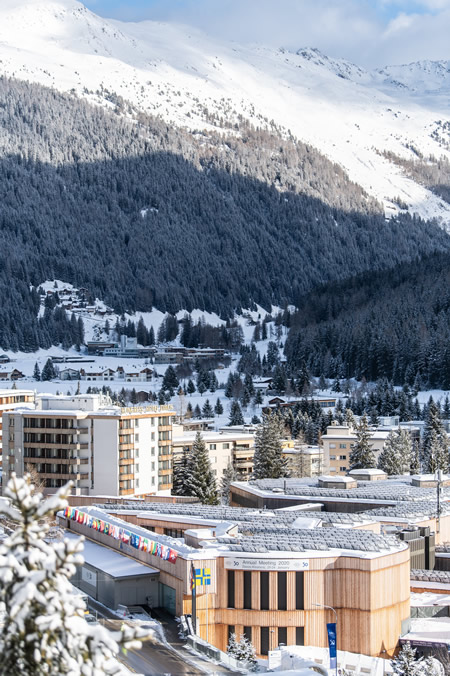
Photo: Scene at the World Economic Forum Annual Meeting 2020 in Davos-Klosters, Switzerland. 18 January 2020. Image provided by & Copyright © World Economic Forum/Mattias Nutt.
Geneva, Switzerland, 15 July 2020 - The global COVID-19 pandemic has caused unprecedented job losses and economic uncertainty. As governments and businesses look to stimulate growth, a new study from the World Economic Forum found that ‘nature-positive’ solutions can create 395 million jobs by 2030.
The Future of Nature and Business Report provides blueprints for businesses to tap into a $10.1 trillion business opportunity, focusing on nature-positive industry actions, meaning that they add value to nature.
The report reflects real-world examples where nature-positive results have improved business outcomes:
- In Indonesia, smart farming utilizing sensors and satellite imagery improved crop yields on average by 60%.
- In China, Suzhou Industrial Park’s green development has seen its GDP increase 260-fold partially through green growth.
- In Viet Nam, people living in coastal communities saw their incomes more than double following the restoration of critical mangroves.
“We can address the looming biodiversity crisis and reset the economy in a way that creates and protects millions of jobs,” said Akanksha Khatri, Head of the Nature Action Agenda, World Economic Forum. “Public calls are getting louder for businesses and government to do better. We can protect our food supplies, make better use of our infrastructure, and tap into new energy sources by transitioning to nature-positive solutions.”
• Food, land, and ocean use: What we eat and grow makes up around $10 trillion of global GDP and employs up to 40% of the worldwide workforce. Nature-positive solutions can create 191 million new jobs and $3.6 trillion of additional revenue or cost savings by 2030. Here are some examples:
Diversifying the diet: Some 75% of the world’s food comes from 12 plants and five animal species. Animal products provide 18% of calories but take up 80% of farmland. A more diversified diet of vegetables and fruits can create $310 billion in business opportunities annually by 2030.
Technology in large-scale farms: Over 4.3 million jobs and $195 billion in business opportunities can come from precision-agriculture technologies by 2030. With 40% improvements in yields expected, investments could yield returns of over 10%.
Retail: Every second, the world landfills or burns the equivalent of one garbage truck of textiles. It means that $500 billion is lost every year due to discarded clothing. Using more renewable inputs and reusing, refurbishing, and recycling clothes could lead to $130 billion in savings and prevent 148 million tonnes of textile waste by 2030.
Fishing: It takes five times the effort to catch the same amount of fish now as it did in 1950. If the ‘business as usual’ approach continues, wild fish stocks will decline by 15%. It will cost the industry $83 billion, as boats will have to travel further and fish deeper. Sustainable ecosystem management is one way to tap into a $40 billion opportunity for the maritime industry worldwide.
• Infrastructure and the built-environment: About 40% of global GDP comes from the environment we build - office buildings, homes, and transport. Nature-positive solutions can create 117 million new jobs and $3 trillion in additional revenue or cost savings by 2030. Here are some examples:
Smart buildings: Retrofitting systems and installing more efficient technology in new builds can save $825 billion by 2030. Switching to LEDs and substituting natural light alone could save over $650 billion by 2030. Green roofs can save on energy costs, mitigate flood risk, reduce air pollution, and even produce food. The market for these could grow 12% annually, reaching $15 billion by 2030.
Smart sensors: Reducing municipal water leakage could save $115 billion by 2030. Return on investments in water efficiency can be above 20%.
Waste management: With $305 billion in additional revenue opportunities, the global waste management market could double in 10 years with the right investments in South Asia, East Asia, and sub-Saharan Africa.
• Energy and extractives: The energy we produce and what we extract accounts for almost a quarter of global GDP and 16% of global employment. With energy demand growing, there is an opportunity to create 87 million jobs and $3.5 trillion in business opportunities by 2030. Here are some examples:
Mining and resource extraction: Improving resource recovery in mining can save $225 billion and reduce water usage by 75% in the next decade. New technologies and more mechanization could enhance material recovery rates by up to 50%.
Circular models in the automotive sector: Refurbishing and reusing automotive parts, such as transmissions, retains more value and uses less energy than recycling. The world can save some $870 billion by recovering manufacturing costs by 2030.
Renewables: By 2030, Renewable energy sources can provide opportunities of $650 billion, and investment returns more significant than 10%. Stimulus packages for solar and other commercialized renewables can generate millions of new jobs. Solar energy without subsidies matched fossil fuel costs in over 30 countries. By 2021, it could be cheaper than coal in China and India.
Doubling down on revenue streams: The land for renewable energy projects is three to 12 times the size of coal-powered ones. Some companies are developing high-rise photovoltaic power stations that combine animal husbandry and ecotourism, providing additional revenue streams on the same land plot.
• Guide for Finance Ministers
A policy companion outlines how governments can complement and enable businesses to act. Finance ministers can combine six cross-cutting policy measures to put the right incentives in place as part of stimulus packages and create jobs without destroying nature. They include better measurement of economic performance beyond GDP, incentives for innovation, improved spatial planning and management of marine and terrestrial assets, the removal of subsidies that endanger long-term job stability, investment in reskilling, and increased financial support for natural solutions.
• Quotes from World Economic Forum Partners
“We must use the crisis caused by the coronavirus pandemic as an opportunity to reset humanity’s relationship with nature. Investing in biodiversity and the environment offers the chance of building better economies and our resilience as a species,” said Carlos Alvarado Quesada, President of Costa Rica. “Costa Rica has shown that the transition to a carbon-neutral, nature-positive economy brings greater prosperity, jobs, and new developments. It’s time to mainstream this model.”
“We are entering into a historic decade of action to halt and reverse biodiversity loss by 2030 and address climate change. The business has a critical role to play in environmental stewardship of our planet,” said Inger Andersen, United Nations Under-Secretary-General and Executive Director of the UN Environment Programme. “They have the technology, innovation, and financing to make the shifts we need towards increased investment in nature’s infrastructure and nature-based solutions.”
“While there is still uncertainty in how COVID-19 will unfold, we must recognize this as an opportunity to accelerate efforts to put nature at the center of all decision-making,” said Alan Jope, Chief Executive Officer of Unilever. “There will be no jobs or prosperity on a dead planet!”
Source: World Economic Forum
|GlobalGiants.Com|







Edited & Posted by the Editor | 7:07 AM | View the original post
June 4, 2020
World Economic Forum to Convene a Unique Twin Summit "The Great Reset" in January 2021.
The twin summit will be both in-person and virtual, connecting key global governmental and business leaders in Davos with a global multistakeholder network in 400 cities around the world for a forward-oriented dialogue driven by the younger generation.
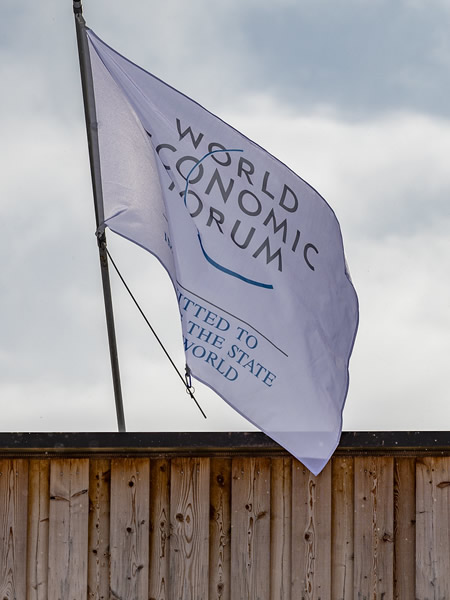
Photo: Impressions from the World Economic Forum Annual Meeting 2020 in Davos-Klosters, Switzerland. Image provided by & Copyright © World Economic Forum / Benedikt von Loebell. [File Photo]

Photo: Impressions from the Opening Concert: An International Call for Unity and Joy, at the World Economic Forum Annual Meeting 2020 in Davos-Klosters, Switzerland. Image provided by & Copyright © World Economic Forum / Christian Clavadetscher. [File Photo]
Geneva, Switzerland, 3 June 2020 - “The Great Reset” will be the theme of a unique twin summit to be convened by the World Economic Forum in January 2021. The 51st World Economic Forum Annual Meeting will bring together global leaders from government, business, and civil society, and stakeholders from around the world in a unique configuration that includes both in-person and virtual dialogues.
“We only have one planet, and we know that climate change could be the next global disaster with even more dramatic consequences for humankind. We have to decarbonize the economy in the short window remaining and bring our thinking and behavior once more into harmony with nature,” said Klaus Schwab, Founder and Executive Chairman of the World Economic Forum.
“To secure our future and to prosper, we need to evolve our economic model and put people and planet at the heart of global value creation. If there is one critical lesson to learn from this crisis, we need to put nature at the heart of how we operate. We can’t waste more time,” said HRH, The Prince of Wales.
“The Great Reset is a welcome recognition that this human tragedy must be a wake-up call. We must build equal, inclusive, and sustainable economies and societies that are more resilient in the face of pandemics, climate change, and the many other global changes we face,” said António Guterres, Secretary-General, United Nations, New York.
“A Great Reset is necessary to build a new social contract that honors the dignity of every human being,” added Schwab. “The global health crisis has laid bare the unsustainability of our old system. We lack social cohesion, equal opportunities, and inclusiveness. Nor can we turn our backs on the evils of racism and discrimination.”
“COVID-19 has accelerated our transition into the age of the Fourth Industrial Revolution. We have to make sure that the new technologies in the digital, biological, and physical world remain human-centered and serve society as a whole, providing everyone with fair access,” he said.
“This global pandemic has also demonstrated again how interconnected we are. We have to restore a functioning system of smart global cooperation structured to address the challenges of the next 50 years. The Great Reset will require us to integrate all global society stakeholders into a community of common interest, purpose, and action,” said Schwab. “We need a change of mindset, moving from short-term to long-term thinking, moving from shareholder capitalism to stakeholder responsibility. Environmental, social and good governance have to be a regular part of corporate and governmental accountability,” he added.
According to the World Economic Forum, this innovative summit will be a very different Annual Meeting. It would reflect the spirit of the Great Reset. It will provide a unique opportunity at the beginning of 2021 to bring together the critical global government and business leaders in Davos. It would be a worldwide multistakeholder summit driven by the younger generation to ensure that the Great Reset dialogue pushes beyond traditional thinking and is genuinely forward-oriented.
To do so, the World Economic Forum will draw on thousands of young people in more than 400 cities around the world (the Global Shapers Community), interconnected with a robust virtual hub network to interact with the leaders in Davos. Each of those hubs will have an open house policy to integrate all interested citizens into this dialogue, making the Annual Meeting open to everyone. Also, global media and social media networks will mobilize millions of people, enabling them to share their input while also providing them with access to the Annual Meeting discussions in Davos.
HRH, The Prince of Wales, and Professor Schwab announced the Great Reset during a virtual meeting. Statements by UN Secretary-General António Guterres and IMF Managing Director Kristalina Georgieva followed the announcement.
All stakeholder groups of global society supported the above statements. The Great Reset supporters include:
- Victoria Alonsoperez, Founder and Chief Executive Officer, Chipsafer, Uruguay, and a Young Global Leader
- Caroline Anstey, President, and Chief Executive Officer, Pact, USA
- Ajay S. Banga, Chief Executive Officer, Mastercard, USA
- Sharan Burrow, General Secretary, International Trade Union Confederation (ITUC), Brussels
- Ma Jun, Chairman, Green Finance Committee, China Society for Finance and Banking, and a Member of the Monetary Policy Committee of the People’s Bank of China
- Bernard Looney, Chief Executive Officer, bp, United Kingdom
- Juliana Rotich, Venture Partner, Atlantica Ventures, Kenya
- Bradford L. Smith, President, Microsoft, USA
- Nick Stern, Chair, Grantham Research Institute on Climate Change and the Environment, United Kingdom.
In the run-up to the Annual Meeting, the Forum will host a virtual series, The Great Reset Dialogues. These dialogues are a joint initiative of the World Economic Forum and HRH The Prince of Wales.
Source: World Economic Forum
|GlobalGiants.Com|







Edited & Posted by the Editor | 7:30 AM | View the original post
January 25, 2020
The World faces Four Main Challenges: Climate Change, Mistrust of Leaders, Increased Geopolitical Tension, and the Dark Side of the Technological Revolution, Says UN Secretary-General.
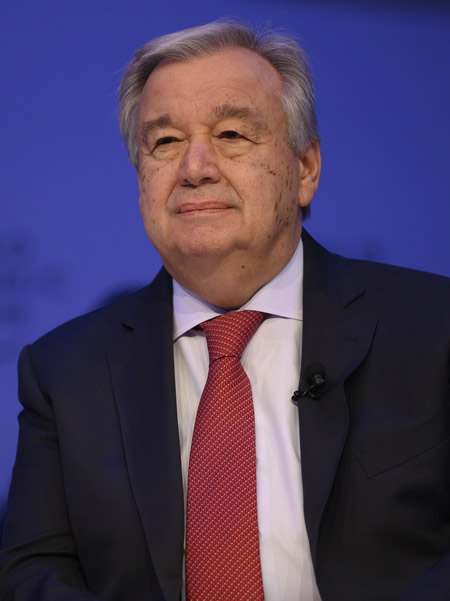
Photo: António Guterres, Secretary-General, United Nations, New York, and the Global Shapers at the World Economic Forum Annual Meeting 2020 in Davos-Klosters, Switzerland, 24 January. Congress Centre. Image provided by & Copyright © World Economic Forum.

Photo: Ivanka Trump, Advisor to the President White House, United States of America, during World Economic Forum Annual Meeting 2020 in Davos-Klosters, Switzerland, 23 January. Image provided by & Copyright © World Economic Forum / Valeriano Di Domenico.
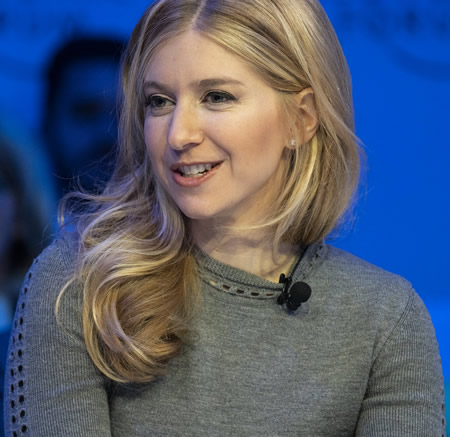
Photo: Sara Eisen, Co-Anchor, Squawk on the Street and Closing Bell, CNBC, USA, speaking in the “After Brexit: Renewing Europe’s Growth” session at the World Economic Forum Annual Meeting 2020 in Davos-Klosters, Switzerland, 23 January. Congress Center - Aspen. Image provided by & Copyright © World Economic Forum/Faruk Pinjo.
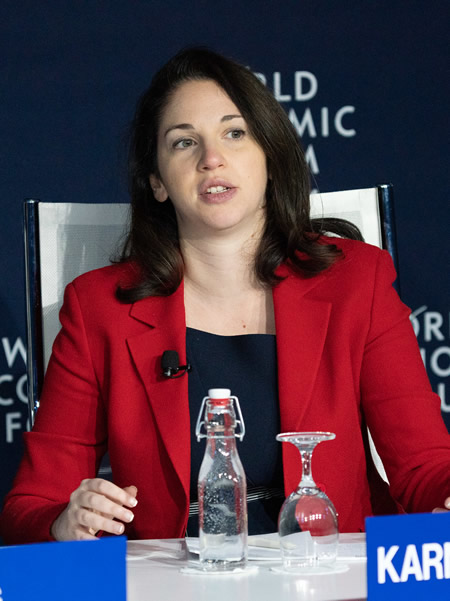
Photo: Karen Karniol-Tambour, Bridgewater Associates LP, speaking in the “Issue briefing: Black Swan and Grey Rhinos in Financial Markets” session at the World Economic Forum Annual Meeting 2020 in Davos-Klosters, Switzerland, 22 January. Congress Centre - Issue Briefing Room. Image provided by & Copyright © World Economic Forum / Greg Beadle.
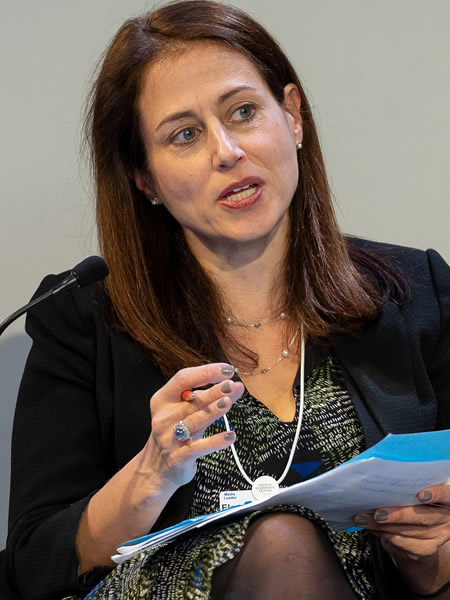
Photo: Elena Cherney, Editor, News Features and Special Projects, Wall Street Journal, USA, speaking in the “The Future of Mobility” session at the World Economic Forum Annual Meeting 2020 in Davos-Klosters, Switzerland, 23 January. Congress Centre - Situation Room. Image provided by & Copyright © World Economic Forum/Sandra Blaser.
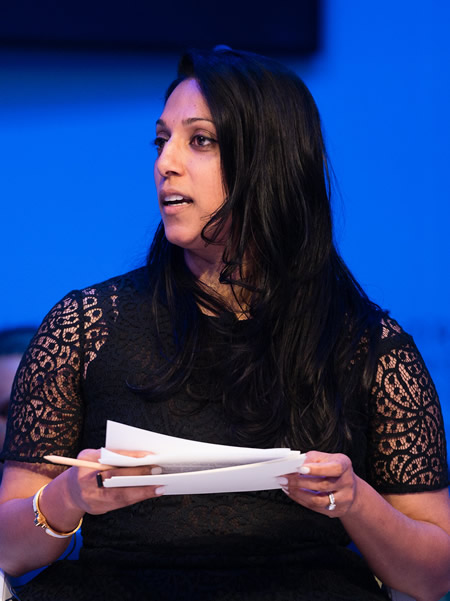
Photo: Penny Abeywardena, Commissioner for International Affairs, Mayor’s Office, City of New York, USA; Young Global Leader speaking in the “Striking a Green New Deal” session at the World Economic Forum Annual Meeting 2020 in Davos-Klosters, Switzerland, 23 January. Congress Centre - Aspen. Image provided by & Copyright © World Economic Forum/Manuel Lopez.
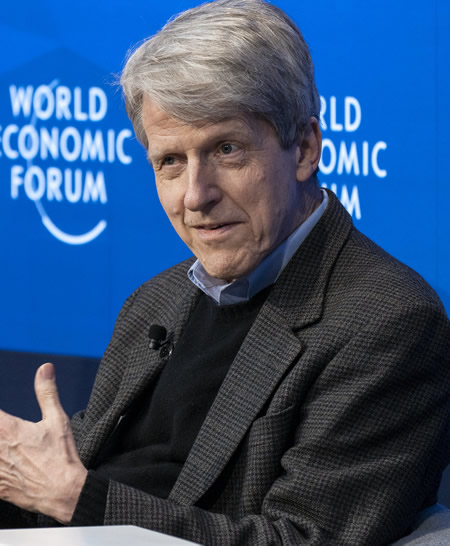
Photo: Robert J. Shiller, Sterling Professor of Economics, Yale University, USA, speaking in the “Power of Narratives” session at the World Economic Forum Annual Meeting 2020 in Davos-Klosters, Switzerland, 23 January. Congress Center - Aspen. Image provided by & Copyright © World Economic Forum/Faruk Pinjo.
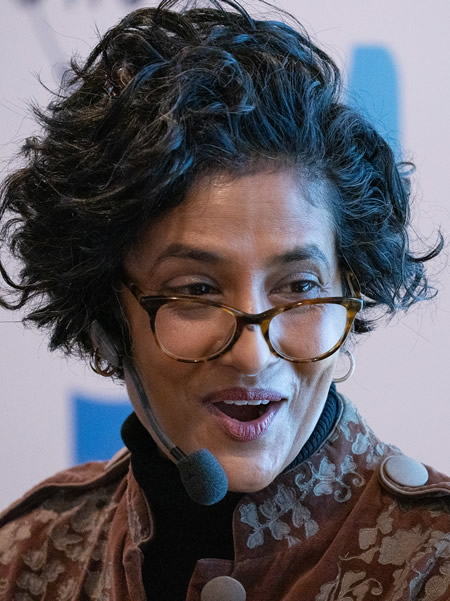
Photo: Somini Sengupta, International Correspondent, Climate Change, New York Times, India, speaking in the Charging the “True Price of Carbon” session at the World Economic Forum Annual Meeting 2020 in Davos-Klosters, Switzerland, 22 January. Congress Centre - Hub B Room. Image provided by & Copyright © World Economic Forum / Greg Beadle.
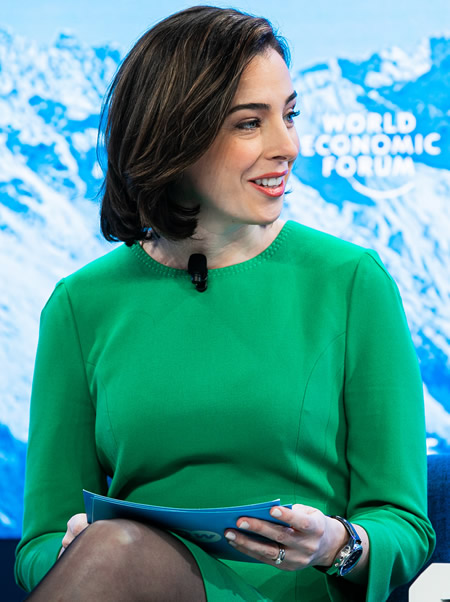
Photo: Sarah Kelly, Anchor-at-Large, Deutsche Welle, USA, speaking during the session “A Decade to Deliver the Global Goals” at the World Economic Forum Annual Meeting 2020 in Davos-Klosters, Switzerland, 23 January. Congress Centre. Image provided by & Copyright © World Economic Forum/Jakob Polacsek.
Davos-Klosters, Switzerland, 24 January 2020 - “I would use two words to describe the state of the world today: uncertainty and instability,” said António Guterres, Secretary-General of the United Nations. Guterres made his statement during a plenary session of the World Economic Forum Annual Meeting 2020.
Using a Christian Biblical reference to the Four Horsemen of the Apocalypse, Guterres described what he called four “enormous challenges” to the world today: climate change, mistrust of leaders, increased geopolitical tension, and the dark side of the technological revolution.
“Climate change is the defining issue of our time,” he said. It represents an “existential threat” to humankind. “The planet will not be destroyed. We will destroy our capacity to live on the planet.”
We need to hold the Carbon emissions below those projected by the Paris Agreement to keep the global temperature within the range targeted by scientists. Countries that he called the “big emitters” will need to make more significant strides; 80% of emissions come from the member nations of the G20 group.
He called for a three-step program to tackle this: carbon pricing, a shift from taxation on income to one on carbon, and the elimination of fossil fuel subsidies. “As a taxpayer, I can’t accept the idea that the Government uses my taxes to melt glaciers,” he said. “It doesn’t make any sense.”
As a measure of mistrust, Guterres noted that 66 countries experienced major demonstrations last year. “In each country, the pretext is different, but there is an underlying factor: mistrust,” he said. “The lack of trust in local establishments.” People believe that the world does not equitably distribute the fruits of globalization. “Seven in 10 people in the world live in countries where inequality is growing.”
His recipe for improvement would start with governments giving a “voice to the people,” particularly to young people, and with particular attention to gender equality. All stakeholders (including civil society, governments, and businesspeople) should work together, notably in the pursuit of the Sustainable Development Goals, he said.
Weaknesses in institutions further exacerbate increased geopolitical tensions. For example, the UN Security Council’s “inability to take decisions” or to enforce the ones they do take, such as the arms embargo for Libya. “We need a global economy,” he said. “And we need multilateral institutions to be in charge.”
To combat “chaos in cyberspace and ensure that artificial intelligence becomes a force for good, we need to boost international cooperation,” he said. To that end, multilateral organizations should change their modus operandi to become more agile, working in networks. “Inclusive multilateralism” would extend beyond national governments to include more participation from local authorities, civil society, business leaders, and others.
The World Economic Forum Annual Meeting 2020 took place from 21 to 24 January 2020 in Davos-Klosters, Switzerland. The meeting brought together more than 3,000 global leaders from politics, government, civil society, academia, the arts, and culture as well as the media. Convening under the theme, Stakeholders for a Cohesive and Sustainable World, participants focused on defining new models for building sustainable and inclusive societies in a plurilateral world.
|GlobalGiants.Com|







Edited & Posted by the Editor | 2:14 PM | View the original post
January 22, 2020
The World Economic Forum launches Reskilling Revolution, an initiative to provide one billion people with better education, skills, and jobs by 2030.
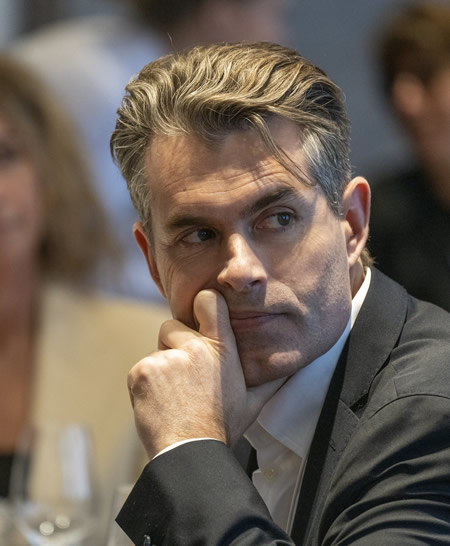
Photo: Impressions during the Creating a Sustainable Business Culture session at the World Economic Forum Annual Meeting 2020 in Davos-Klosters, Switzerland, 21 January. Ameron Swiss Mountain Hotel, Symondpark. Image provided by & Copyright © World Economic Forum/Faruk Pinjo.
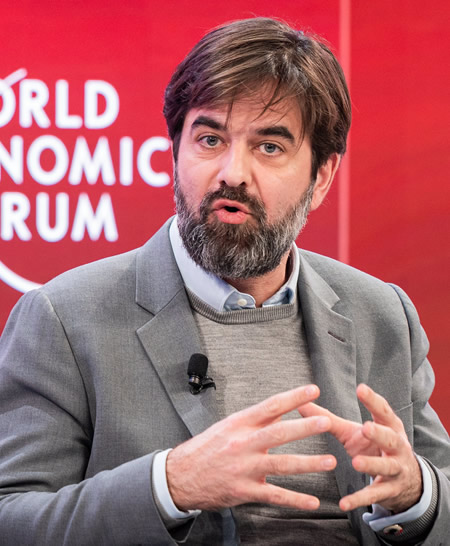
Photo: Pierre Hubbard, General Secretary, Trade Union Advisory Committee (TUAC) to the OECD, France, speaking in the Humans behind Machines at the World Economic Forum Annual Meeting 2020 in Davos-Klosters, Switzerland, 22 January. Congress Centre - Sanada. Image provided by & Copyright © World Economic Forum / Manuel Lopez.
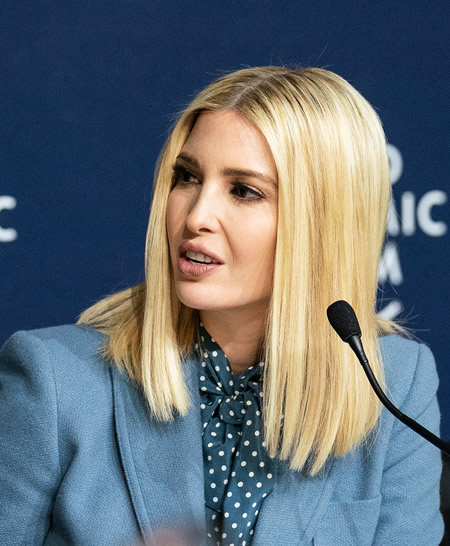
Photo: Ivanka Trump, Assistant, and Adviser to the President of the United States speaking in the Press Conference: Reskilling Revolution: Better Skills for a Billion People by 2030 at the World Economic Forum Annual Meeting 2020 in Davos-Klosters, Switzerland, 22 January. Media Village - Press Conference Room. Image provided by & Copyright © World Economic Forum/Sikarin Fon Thanachaiary.
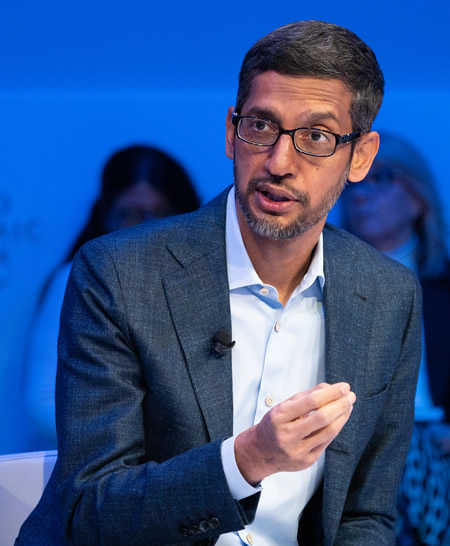
Photo: Sundar Pichai, Chief Executive Officer, Google, USA, speaking in the An Insight, An Idea with Sundar Pichai session at the World Economic Forum Annual Meeting 2020 in Davos-Klosters, Switzerland, 22 January. Congress Centre - Aspen 1 Room. Image provided by & Copyright © World Economic Forum/ Greg Beadle.
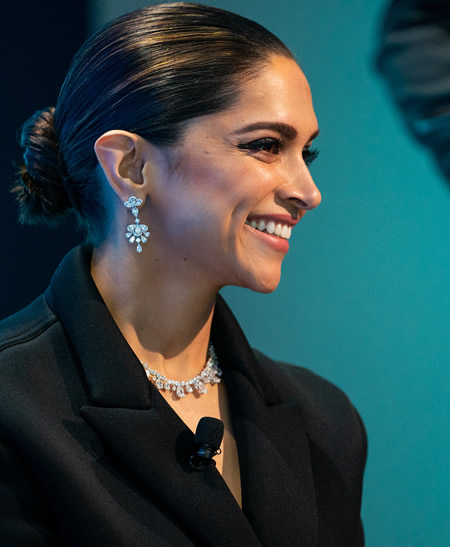
Photo: Deepika Padukone, Founder, Live Love Laugh Foundation, India; Cultural Leader, speaking in the “An Insight, An Idea with Deepika Padukone” session at the World Economic Forum Annual Meeting 2020 in Davos-Klosters, Switzerland, 21 January 2020. Image provided by & Copyright © World Economic Forum / Boris Baldinger.
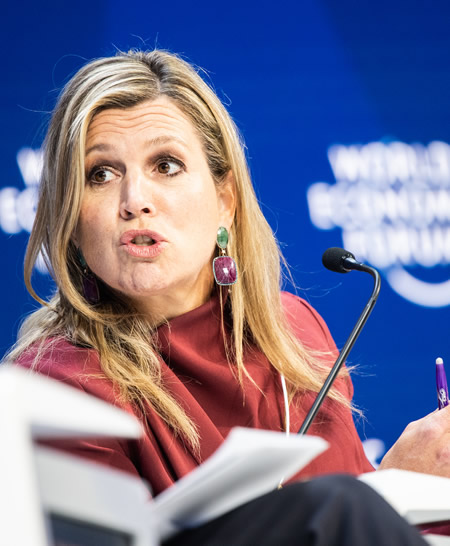
Photo: Queen Máxima of the Netherlands, speaking in the High-Level Panel on Africa session at the World Economic Forum Annual Meeting 2020 in Davos-Klosters, Switzerland, 21 January. Congress Centre - Congress Hall. Image provided by & Copyright © World Economic Forum/Mattias Nutt.
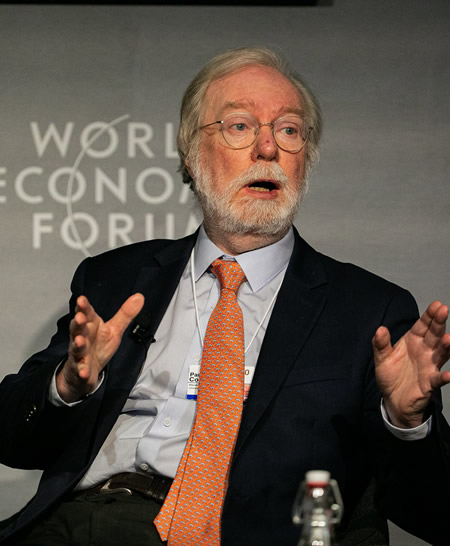
Photo: Paul Collier, Professor of Economics and Public Policy, Blavatnik School of Government, University of Oxford, United Kingdom, speaking in “The Future of the Corporation” at the World Economic Forum Annual Meeting 2020 in Davos-Klosters, Switzerland, 21 January. Congress Centre - in Spotlight Room. Image provided by & Copyright © World Economic Forum/Jakob Polacsek.
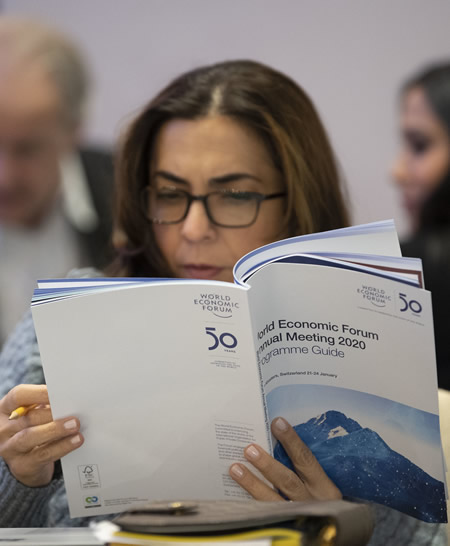
Photo: Impressions from the World Economic Forum Annual Meeting 2020 in Davos-Klosters, Switzerland, 20 January. Image provided by & Copyright © World Economic Forum / Valeriano Di Domenico.
Davos, Switzerland, Wednesday, 22 January 2020 - The World Economic Forum today launched Reskilling Revolution, a multistakeholder initiative aiming to provide better education, new skills, and better work to a billion people around the world by 2030.
The Reskilling Revolution platform would prepare the global workforce with the skills needed to future-proof their careers against the expected displacement of millions of jobs as a result of technological change. It would also provide businesses and economies with the skilled labor needed to fulfill the millions of new roles that will be created by the Fourth Industrial Revolution, shifts in the global economy, and industrial transitions towards sustainability.
“The best way to foster a more cohesive and inclusive society is to provide everybody with a decent job and income. Here in Davos, we are creating a public-private platform to give one billion people the skills they need in the age of the Fourth Industrial Revolution. The scale and urgency of this transformation calls for nothing short of a reskilling revolution,” said Klaus Schwab, Founder, and Executive Chairman, World Economic Forum.
• National and industry transformation
To effect such systems-wide change, Reskilling Revolution will serve as a platform for connecting and coordinating individual initiatives within specific countries, industries, organizations, and schools. At the country-level, the governments of India, Oman, Pakistan, the Russian Federation, the United Arab Emirates Denmark, and Singapore would support the Reskilling Revolution.
In the private sector, several companies are already taking coordinated action on workforce transformations through cross-industry collaborations involving business, trade unions, and the training sector. These industry accelerators include Advanced Manufacturing; Aerospace; Aviation, Travel and Tourism; Consumer; Financial Services; Media, Entertainment and Information; Mining and Metals; Oil and Gas; and Health and Healthcare.
• Founding partners, initiatives and coalitions to reach 250 million people
Together, founding partners’ initiatives and coalitions already signed up to the Reskilling Revolution have the capability of reaching 250 million people worldwide. The Reskilling Revolution Platform will enable these coalitions and future business-led initiatives to create system-level change or to be scaled up through replication by other organizations.
Founding business pledges include:
• The Adecco Group aims to support 5 million workers through upskilling and reskilling globally by 2030. The Group’s General Assembly business will play a vital role as a founding member of the Skills Consortium of online training and learning providers, as part of the Reskilling Revolution initiative. The Adecco Group Foundation will contribute as a founding partner to the HR Valley initiative - a hub of human capital management learning.
• Coursera Inc. will be a data partner and a founding member of the Skills Consortium of online training and learning providers hosted by the Reskilling Revolution. It has committed to upskilling 10 million global workers by 2030 in high-demand domains of Data Science, Technology, Business, and Soft skills.
• Infosys is expanding computer science and maker education to K-12 students and teachers across the US, especially among under-represented communities, and will become a founding member of a Skills Consortium of online training and learning providers hosted by Reskilling Revolution.
• LinkedIn will be a data partner for the Reskilling Revolution initiative. Manpower Group’s MyPath is enabling hundreds of thousands of people to access high-growth roles by providing accelerated upskilling, on-the-job training, and certification.
• PwC and its New World. New Skills. The program will deploy skills to support public-private collaborations through the Reskilling Revolution. It will also help clients prepare their workforces for the digital world, upskill each of its 276,000 people and scale up its community programs, particularly in areas where there is an acute need.
• Salesforce has committed to help train 1 million people with relevant skills and reach 10 million active users on Trailhead, Salesforce’s free online learning platform, within the next five years. Through workforce development initiatives, including Trailhead Military, FutureForce, and the Pathfinder Program, all powered by Trailhead, anyone can skill-up to learn in-demand skills and earn credentials to land a top job in tech.
“The United States is a leading example of when the public and private sector comes together to prioritize workers. The Trump Administration would change one billion lives by 2030 through this Reskilling Revolution through its Pledge to America’s Workers,” said Ivanka Trump, Assistant, and Adviser to the President of the United States.
“We are excited to partner with the World Economic Forum through the Reskilling Revolution initiative. As the availability of digital talent continues to be one of the greatest barriers for enterprises to transform, organizations need to nurture a culture that enables talent - across disciplines and skills - to benefit from a continuum of lifelong learning that prepares them for the future of work. We are keen to help drive the transformation”, said Salil Parekh, Chief Executive Officer, and Managing Director, Infosys.
The World Economic Forum’s Reskilling Revolution Platform for Shaping the Future of the New Economy and Society provides the opportunity to advance prosperous, inclusive, and equitable economies and societies. It focuses on co-creating a new vision in three interconnected areas: growth and competitiveness; education, skills and work; and equality and inclusion. Working together, stakeholders deepen their understanding of complex issues, shape new models and standards and drive scalable, collaborative action for systemic change.
Over 100 of the world’s leading companies and 100 international, civil society and academic organizations currently work through the Platform. They promote new approaches to competitiveness in the Fourth Industrial Revolution.
|GlobalGiants.Com|







Edited & Posted by the Editor | 1:58 PM | View the original post
January 20, 2020
World Economic Forum Presents 2020 Crystal Awards
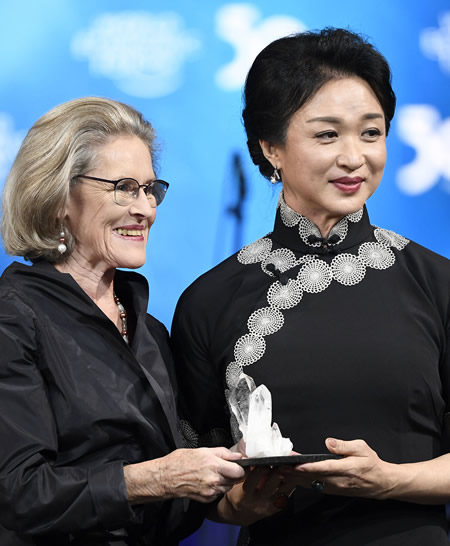
Photo: Hilde Schwab, Chairperson, and Co-Founder, Schwab Foundation for Social Entrepreneurship; Cultural Leader and Jin Xing, Choreographer and Founder, Jin Xing Dance Theatre Shanghai, People’s Republic of China; Cultural Leader speaking in The 26th Annual Crystal Award Ceremony session at the World Economic Forum Annual Meeting 2020 in Davos-Klosters, Switzerland, 20 January. Conference Center - Congress Hall. Image provided by & Copyright © World Economic Forum/ Valeriano Di Domenico.
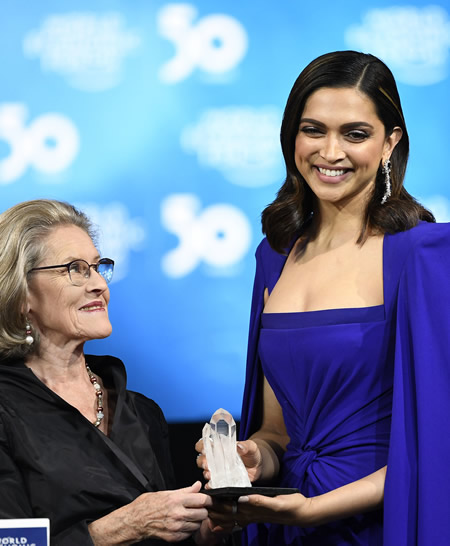
Photo: Hilde Schwab, Chairperson, and Co-Founder, Schwab Foundation for Social Entrepreneurship; Cultural Leader and Deepika Padukone, Founder, Live Love Laugh Foundation, India; Cultural Leader speaking in The 26th Annual Crystal Award Ceremony session at the World Economic Forum Annual Meeting 2020 in Davos-Klosters, Switzerland, 20 January. Conference Center - Congress Hall. Image provided by & Copyright © World Economic Forum/ Valeriano Di Domenico.
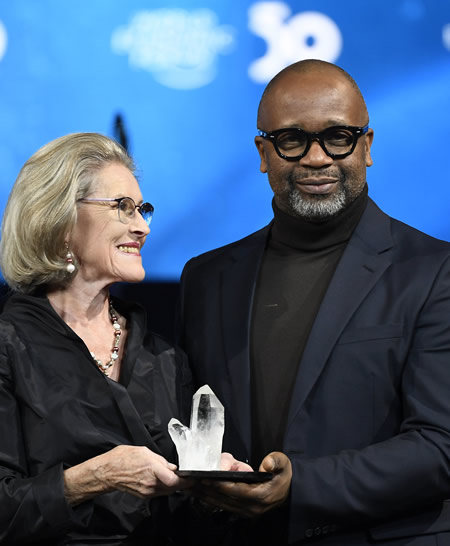
Photo: Hilde Schwab, Chairperson, and Co-Founder, Schwab Foundation for Social Entrepreneurship; Cultural Leader and Theaster Gates, Founder, and Director, Rebuild Foundation, Cultural Leader speaking in The 26th Annual Crystal Award Ceremony session at the World Economic Forum Annual Meeting 2020 in Davos-Klosters, Switzerland, 20 January. Conference Center - Congress Hall. Image provided by & Copyright © World Economic Forum/ Valeriano Di Domenico.
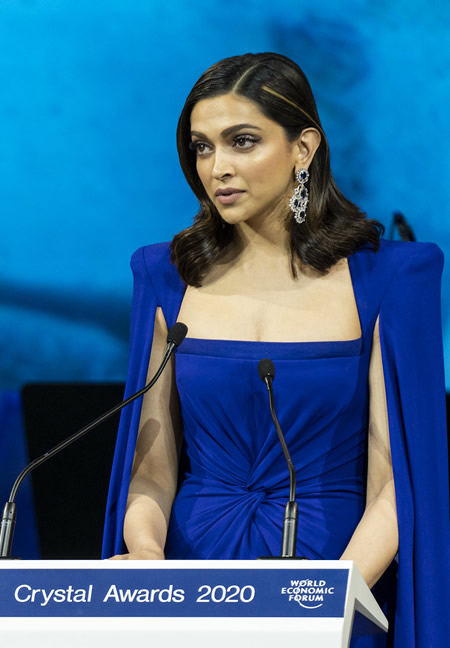
Photo: Deepika Padukone, Founder, Live Love Laugh Foundation, India; Cultural Leader speaking in The 26th Annual Crystal Award Ceremony session at the World Economic Forum Annual Meeting 2020 in Davos-Klosters, Switzerland, 20 January. Conference Center - Congress Hall. Image provided by & Copyright © World Economic Forum/ Faruk Pinjo.
Geneva, Switzerland, 20 January 2020 - Artist Theaster Gates, choreographer, and media personality Jin Xing, actor Deepika Padukone and artist Lynette Wallworth are the recipients of the World Economic Forum 26th Annual Crystal Award. The award celebrates the achievements of artists and cultural figures whose leadership inspires inclusive and sustainable change. The winners were honored in the opening session of the World Economic Forum Annual Meeting 2020 in Davos-Klosters, Switzerland, on Monday 20 January.
“These wonderful cultural leaders are bridge-builders. They connect us. They help us reflect on the human condition, and they provide visions of the world that can cut through the limitations of short-term or linear thinking,” said Hilde Schwab, Chairwoman, and Co-Founder of the World Arts Forum, which hosts the awards.
Award recipients
• Theaster Gates, for his leadership in creating sustainable communities
Theaster Gates is an artist who lives and works in Chicago. Drawing on his interest and training in urban planning and preservation, Gates creates works that focus on space theory, land development, sculpture, and performance. In 2010, Gates established the Rebuild Foundation to galvanize communities through neighborhood regeneration and the development of educational and arts programming. Many of the foundation’s initiatives are centered on the revitalization of Chicago’s South Side, creating hubs and archives for the black culture that serve as catalysts for discussions on race, equality, space, and history. Gates is a professor at the University of Chicago in the Department of Visual Arts and the Harris School of Public Policy and is Distinguished Visiting Artist and Director of Artist Initiatives at the Lunder Institute for American Art at Colby College.
“Special thanks to the World Economic Forum for this most prized Crystal Award. The impact of the arts and artists is incomparable when we think about the transformation of cities and towns. I am honored to work as a believer in beauty and creativity and hope the work and the ideals that I lead within Chicago have resonance throughout the world,” said Gates.
• Jin Xing, for her leadership in shaping inclusive cultural norms
Jin Xing is a choreographer, media personality, and China’s most popular TV host. She is the founder of the award-winning Jin Xing Dance Theatre, the country’s first independent dance company. Her television shows, which include Venus Hits Mars, The Jin Xing Show, and Chinese Dating, draw more than 100 million viewers a week and create a space for discussion on contemporary life in China. She is a Chevalier de l’Ordre des Arts et des Lettres of France and received an honorary Doctorate of Dance from the Royal Conservatoire of Scotland.
“In today’s complex and fractured world, I pursue my mission to be true to the society, to be a true voice for the public, as an artist, a public figure and as a human being. I’m grateful and honored to receive this year’s Crystal Award. This honor encourages me to continue my mission and be crystal clear towards life,” said Jin.
• Deepika Padukone, for her leadership in raising mental health awareness
Deepika Padukone is an internationally acclaimed actor, fashion icon, and mental health ambassador from India. She has acted in close to 30 feature films across genres and won several awards for her performances. Many of her films also rank among the highest-grossing movies of all time. Padukone was diagnosed with clinical depression in 2014 and sought professional help to aid her recovery. In June 2015, she founded The Live Love Laugh Foundation (TLLLF) to give hope to every person experiencing stress, anxiety, and depression (SAD). The foundation’s programs and initiatives include nationwide public awareness and destigmatization campaigns, adolescent mental health programs, funding support for treatment in rural communities, general training physicians in common mental health disorders, research, and an annual lecture series featuring the world’s foremost thinkers and achievers.
“With more than 300 million people suffering from the illness, depression is the leading cause of ill health and disability in the world today and a major contributor to the overall global burden of disease. I am humbled and deeply honored to be chosen for this year’s Crystal Award and dedicate the award to the millions around the world who experience stress, anxiety and depression, and other forms of mental illness,” Padukone said.
• Lynette Wallworth, for her leadership in creating inclusive narratives
Lynette Wallworth is an Australian artist whose immersive video installations, virtual reality, and film works reflect the connections between people and the natural world. She won an Emmy Award for her virtual reality film Collisions, which the World Economic Forum commissioned, premiered, and executive-produced. Wallworth was named one of the “100 Leading Global Thinkers” by Foreign Policy magazine for immersing audiences in the destructive power of nuclear weapons. Her 2018 mixed-reality film Awavena, the story of the first woman Shaman from the Yawanawa tribe in Brazil, as well as her most recent works, have been made at the invitation of indigenous communities. She is a member of the World Economic Forum’s Global Future Council on Virtual and Augmented Reality and a member of the Board of Trustees of the Sundance Institute.
“I have sought to use my skills as an artist to bring unheard voices, including indigenous voices. These voices ring out with resilience, persistence, power, and grace. In supporting my work, the creation and the presentation of it, the World Economic Forum has helped me place it in front of those I most wished to impact, those whose decisions help shape our shared future. I am immensely grateful that these works, these voices, have been heard and are being honored by a Crystal Award,” said Lynette Wallworth.
The World Economic Forum Annual Meeting brings together leaders from government, international organizations, business, civil society, the arts and culture and media, foremost experts, and the young generation from all over the world, at the highest level and in representative ways. It engages some 50 heads of state and government, more than 300 ministerial-level government participants, and business representation at the chief executive officer and chair level.
|GlobalGiants.Com|







Edited & Posted by the Editor | 3:07 PM | View the original post
January 18, 2020
Piyush Goyal to lead Indian Delegation to World Economic Forum 2020
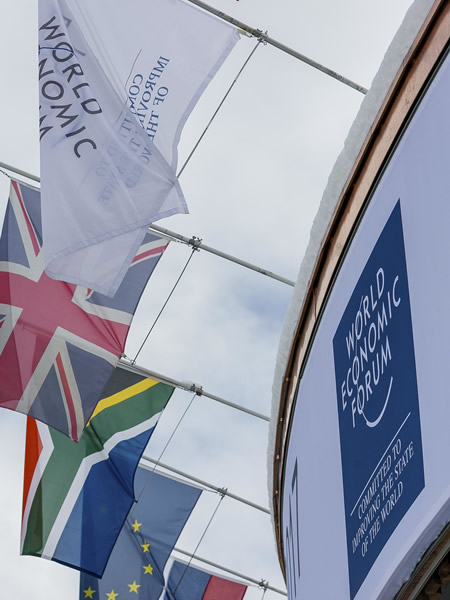
Photo: Impressions from the Conference Center. At the Annual Meeting 2018 of the World Economic Forum in Davos. Image provided by & Copyright © World Economic Forum / Benedikt von Loebell. [File Photo]
New Delhi, 17 January 2020 — Union Minister of Commerce and Industry & Railways, Piyush Goyal, will lead the Indian delegation to the 50th World Economic Forum (WEF) at Davos from 20 January to 24th 2020. The Commerce and Industry Minister will participate in the WEF along with Union Minister of State for Shipping and Chemical & Fertilizers, Mansukh L. Mandaviya, and Chief Ministers of the States of Karnataka and Madhya Pradesh, the Finance Minister of Punjab, and the IT Minister of Telangana. Secretary Department for Promotion of Industry and Internal Trade, senior officials of the Ministry of Commerce and Industry, and Invest India are also part of the delegation.
Commerce and Industry Minister will hold bilateral meetings with Ministers of Australia, South Africa, Russia, Saudi Arabia, Switzerland, Korea, and Singapore. He will also meet the Director-General of the World Trade Organization and Secretary-General of Organisation for Economic Co-operation and Development (OECD).
Apart from this, Commerce and Industry Minister will hold bilateral meetings with CEOs of companies, attend WEF sessions and round tables on Accelerating Investments in Indian Railways and attracting Global Institutional Investments in India.
Commerce and Industry Minister will also participate in an informal WTO Ministerial gathering in Davos.
The WEF annual meeting in Davos engages the world’s top leaders to shape global, regional, and industry agendas at the beginning of the year. The theme of the 2020 meeting is “Stakeholders for a Cohesive and Sustainable World.”
|GlobalGiants.Com|







Edited & Posted by the Editor | 6:24 AM | View the original post
January 14, 2020
The World Economic Forum Annual Meeting 2020 will convene under the theme, Stakeholders for a Cohesive and Sustainable World.
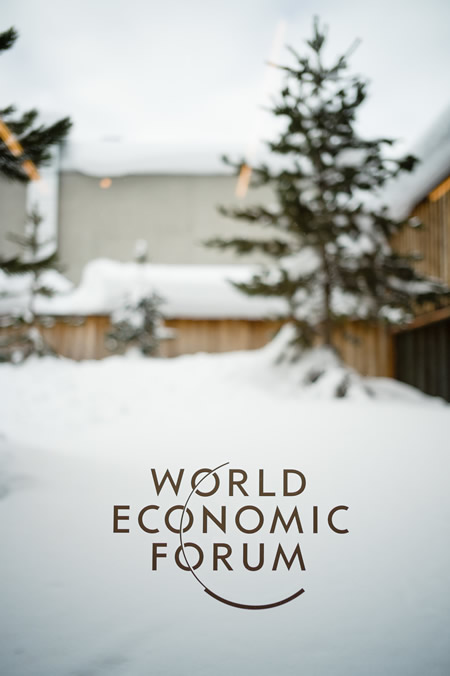
Photo: Impressions from the Annual Meeting 2019 of the World Economic Forum in Davos. Image provided by & Copyright © World Economic Forum / Manuel Lopez. [File Photo]
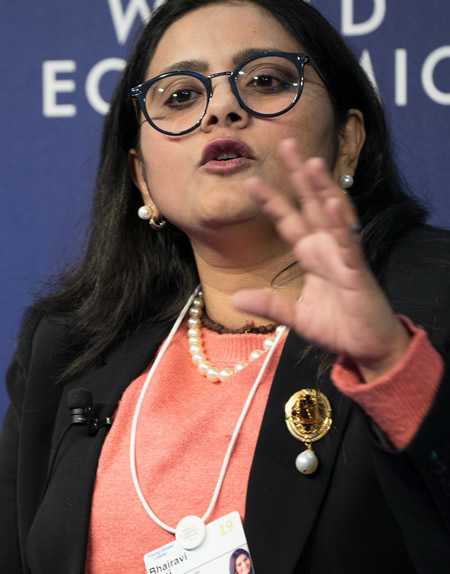
Photo: Bhairavi Jani, Executive Director, SCA Group of Companies, India; Young Global Leader, speaking during the Session “Future Frontiers of Global Value Chains” in “Situation Room” at the Annual Meeting 2019 of the World Economic Forum in Davos. Image provided by & Copyright © World Economic Forum / Greg Beadle. [File Photo]
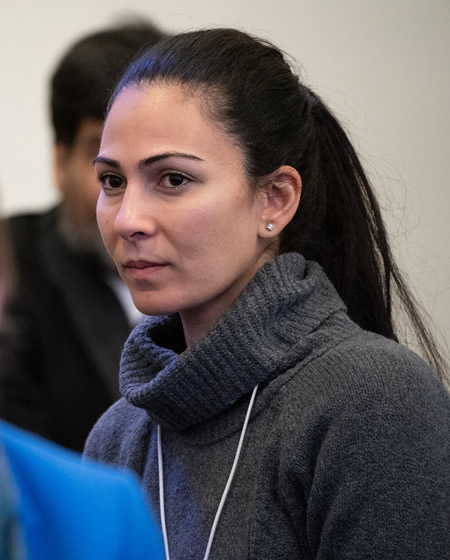
Photo: A Participants during the Session “What Should Globalization 4.0 Look Like?” in “Ideas Lab” at the Annual Meeting 2019 of the World Economic Forum in Davos. Image provided by & Copyright © World Economic Forum / Greg Beadle. [File Photo]
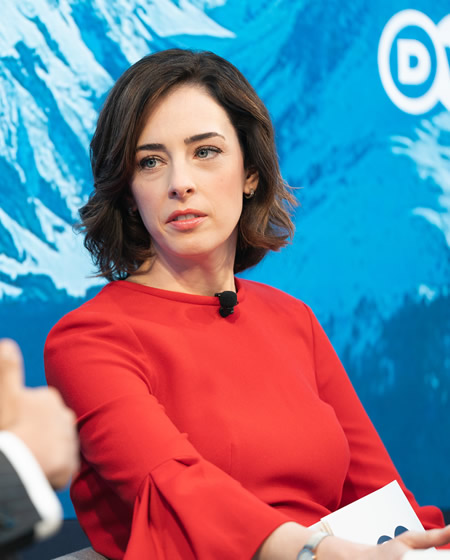
Photo: Sarah Kelly, Anchor-at-Large, Deutsche Welle, USA, captured during the Session “A ‘Fourth Social Revolution’?” at the Annual Meeting 2019 of the World Economic Forum in Davos Congress Centre. Image provided by & Copyright © World Economic Forum / Sikarin Fon Thanachaiary. [File Photo]
Geneva, Switzerland, 14 January 2020 - The World Economic Forum Annual Meeting 2020, taking place on 21-24 January in Davos-Klosters, Switzerland, will focus on establishing stakeholder capitalism as a way of addressing the world’s most significant challenges. These challenges include societal divisions created by income inequality and political polarization to the climate crisis we face today.
Underpinning the meeting will be the Davos Manifesto 2020. This document builds on the original Davos Manifesto of 1973, which set out for the first time the stakeholder concept that businesses should serve the interests of all society rather than merely their shareholders. The Davos Manifesto 2020 provides a vision for stakeholder capitalism that touches on a range of essential issues of our time, including fair taxation, zero tolerance for corruption, executive pay, and respect for human rights.
“Business has now to fully embrace stakeholder capitalism, which means not only maximizing profits but use their capabilities and resources in cooperation with governments and civil society to address the critical issues of this decade. They have to contribute to a more cohesive and sustainable world actively,” said Klaus Schwab, Founder and Executive Chairman of the World Economic Forum.
Building on the Manifesto 2020, this year’s program focuses on achieving maximum impact on the Forum’s platform for public-private cooperation across six core areas of activity: Ecology, Economy, Society, Industry, Technology, and Geopolitics. More than 160 individual initiatives, each capable of delivering system-wide transformation, are active on the Forum platform. Significant advances in a number of these, especially in the fields of responsible business, the environment, and social mobility, are expected to be confirmed during the meeting.
Among the initiatives to be launched at the Annual Meeting is one that aims to plant 1 trillion trees over the next decade and to equip 1 billion people with the necessary skills in the age of the Fourth Industrial Revolution.
Nearly 3,000 leaders will participate in this year’s Annual Meeting. Top political leaders taking part include:
- Donald Trump, President of the United States of America;
- Han Zheng, Vice-Premier of the People’s Republic of China;
- Angela Merkel, Federal Chancellor of Germany;
- Giuseppe Conte, Prime Minister of Italy;
- H.R.H. The Prince of Wales;
- Ursula von der Leyen, President of the European Commission;
- Pedro Sanchez, Prime Minister of Spain;
- Simonetta Sommaruga, President of the Swiss Confederation;
- Mohammad Ashraf Ghani, President of the Islamic Republic of Afghanistan;
- Sebastian Kurz, Federal Chancellor of Austria;
- Ivan Duque, President of Colombia;
- Félix Antoine Tshisekedi Tshilombo, President of the Democratic Republic of Congo;
- Lenin Moreno Garcés, President of Ecuador;
- Sanna Marin, Prime Minister of Finland;
- Nana Addo Dankwa Akufo-Addo, President of the Republic of Ghana;
- Kyriakos Mitsotakis, Prime Minister of Greece;
- Barham Salih, President of Iraq;
- Leo Varadkar, Taoiseach of Ireland;
- Omar Al Razzaz, Prime Minister of Jordan;
- Khaltmaagiin Battulga, President of Mongolia;
- Mark Rutte, Prime Minister of the Netherlands;
- Erna Solberg, Prime Minister of Norway;
- Imran Khan, Prime Minister of Pakistan;
- Mohammad Ibrahim Shtayyeh, Prime Minister of the Palestinian National Authority;
- Andrzej Duda, President of Poland;
- Maxim Oreshkin, Minister of Economic Development of the Russian Federation;
- Macky Sall, President of Senegal;
- Lee Hsien Loong, Prime Minister of Singapore;
- Kais Saied, President of Tunisia;
- Volodymyr Zelenskyy, President of Ukraine.
Leaders from international organizations include:
- Antonio Guterres, Secretary-General, United Nations;
- Kristalina Georgieva, Managing Director, International Monetary Fund;
- Roberto Azevêdo, Director-General, World Trade Organization (WTO);
- Mohammad Sanusi Barkindo, Secretary-General, Organization of the Petroleum Exporting Countries (OPEC);
- David Beasley, Executive Director, United Nations World Food Programme (WFP);
- Filippo Grandi, United Nations High Commissioner for Refugees;
- Liu Fang, Secretary-General, International Civil Aviation Organization (ICAO;
- Tedros Adhanom Ghebreyesus, Director-General, World Health Organization (WHO);
- Angel GurrÃa, Secretary-General, Organisation for Economic Co-operation and Development (OECD);
- Christine Lagarde, President, European Central Bank;
- Peter Maurer, President, International Committee of the Red Cross (ICRC);
- Luis Alberto Moreno, President, Inter-American Development Bank;
- Guy Ryder, Director-General, International Labour Organization (ILO);
- Jürgen Stock, Secretary-General, International Criminal Police Organization (INTERPOL);
- Jens Stoltenberg, Secretary-General, North Atlantic Treaty Organization (NATO).
More than 1,680 leaders from the private sector will participate in the Annual Meeting this year, including Members and Partners of the World Economic Forum.
Leaders from civil society taking part in the meeting include:
- Sharan Burrow, General Secretary, International Trade Union Confederation (ITUC);
- Luca Visentini, General Secretary, European Trade Union Confederation (ETUC);
- Micah White, Co-Creator, Occupy Wall Street;
- Kenneth Roth, Executive Director, Human Rights Watch;
- Jennifer Morgan, Executive Director, Greenpeace International;
- David Miliband, President, International Rescue Committee;
- Seth F. Berkley, Chief Executive Officer, Gavi, the Vaccine Alliance;
- Hindou Oumarou Ibrahim, President, Association for Indigenous Women and Peoples of Chad (AFPAT);
- His All-Holiness Patriarch Bartholomew, Archbishop of Constantinople-New Rome and Ecumenical Patriarch.
Adding a new dimension this year is the Arts and Culture Festival. Running alongside the Annual Meeting, the Festival will feature several sessions and immersive art installations, including those featuring the participation of the winners of the 26th Annual Crystal Awards and WEF Cultural Leaders.
|GlobalGiants.Com|

The world appreciates World Economic Forum’s unique heroic profession of improving the state of the world and commends its 2020 Annual Meeting’s theme “Stakeholders for a Cohesive and Sustainable World.”
The world trusts that all companies would read and acknowledge the “Davos Manifesto 2020”, which sets forth “The Universal Purpose of a Company in the Fourth Industrial Revolution”.
The world expects that the World Economic Forum 2020 Annual Meeting would set the ball rolling by extensively publicizing forceful recommendations that are balanced, universally acceptable, strategic, holistic, achievable, operational, and friendly.







Edited & Posted by the Editor | 7:08 PM | View the original post
November 18, 2019
World Economic Forum Annual Meeting in January 2020 in Davos, Switzerland to focus on 'Defining Stakeholder Capitalism'
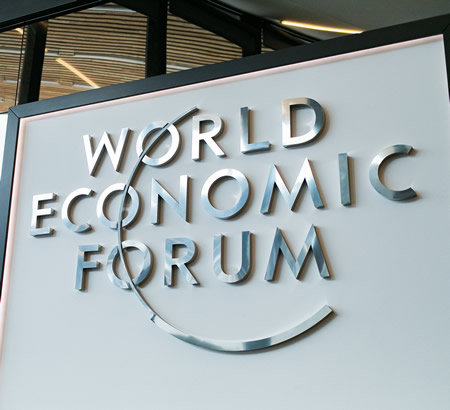
Photo: Impressions at the Annual Meeting 2019 of the World Economic Forum in Davos, January 2019. Image provided by & Copyright © World Economic Forum / Jakob Polacsek.
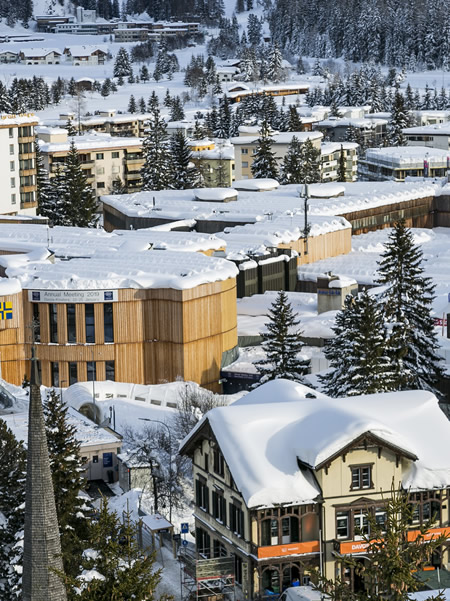
Photo: Impressions at the Annual Meeting 2019 of the World Economic Forum in Davos, January 2019. Image provided by & Copyright © World Economic Forum / Benedikt von Loebell.
Geneva, Switzerland, 18 November 2019 - The World Economic Forum recently announced the theme and details for its 50th Annual Meeting, to be held 21-24 January 2020, in Davos, Switzerland.
The Meeting’s theme will be ‘Stakeholders for a Cohesive and Sustainable World.’ It will bring together 3,000 participants from around the world, and aim to give concrete meaning to “stakeholder capitalism,” assist governments and international institutions in tracking progress towards the Sustainable Development Goals, and facilitate discussions on technology and trade governance.
“People are revolting against the economic ‘elites’ they believe have betrayed them. And our efforts to keep global warming limited to 1.5°C are falling dangerously short,” said Professor Klaus Schwab, Founder and Executive Chairman at the World Economic Forum. “With the world at such critical crossroads, this year we must develop a ‘Davos Manifesto 2020’ to reimagine the purpose and scorecards for companies and governments. It is what for which we founded the World Economic Forum 50 years ago, and it is what we want to contribute to for the next 50 years.”
The Programme for the Annual Meeting will prioritize six key areas:
• Ecology: How to mobilize businesses to respond to the risks of climate change and ensure that measures to protect biodiversity reach forest floors and ocean beds.
• Economy: How to remove the long-term debt burden. And how to keep the economy working at a pace that allows higher inclusion.
• Technology: How to create a global consensus on deployment of Fourth Industrial Revolution technologies and avoid a ‘technology war.’
• Society: How to reskill and upskill, a billion people in the next decade.
• Geopolitics: How the ‘spirit of Davos’ can create bridges to resolve conflicts in global hotspots. Informal meetings to set kickstart conciliation.
• Industry: How to help businesses create the models necessary to drive enterprise in the Fourth Industrial Revolution. And how to navigate an enterprise in a world influenced by politics, driven by exponential technological changes, and increasing expectations from all stakeholders.
The Forum’s first Meeting in 1971 was established to further the idea put forward by Professor Klaus Schwab that business should serve all stakeholders - customers, employees, communities, as well as shareholders.
According to WEF, the 2020 Annual Meeting will be among the “most sustainable international summits ever held.”
“Awarded the IS0 20121 standard for sustainable events in 2018, the Annual Meeting is fully carbon neutral through reducing, calculating and offsetting event-related emissions”, WEF stated.
Meanwhile, Muriel Pénicaud, Minister of Labour of France, and Mark Schneider, Chief Executive Officer of Nestlé, Switzerland, will join the Board of Trustees of the World Economic Forum.
“The World Economic Forum, as the International Organization for Public-Private Cooperation, is delighted to welcome Muriel Pénicaud and Mark Schneider to its Board of Trustees. We look forward to working together to deliver positive, transformative solutions to our most critical global, regional and industry challenges,” said Klaus Schwab, Founder and Executive Chairman of the World Economic Forum.
As of 15 November 2019, the Members of the Board of Trustees of the World Economic Forum are:
- Klaus SCHWAB Chairman of the Board of Trustees, World Economic Forum
- Peter BRUBECK-LETMATHE Vice-Chairman, Board of Trustees, World Economic Forum
- Mukesh AMBANI Chairman and Managing Director, Reliance Industries, India
- Marc BENIOFF Chairman and Co-Chief Executive Officer, Salesforce, USA
- Mark CARNEY Governor of the Bank of England
- Laurence D. FINK Chairman and Chief Executive Officer, BlackRock, Inc.
- Chrystia FREELAND Minister of Foreign Affairs of Canada
- Orit GADIESH Chairman, Bain & Company, USA
- Fabiola GIANOTTI Director-General, European Organization for Nuclear Research (CERN), Geneva
- Al GORE Vice-President of the United States (1993-2001); Chairman and Co-Founder, Generation Investment Management, USA
- Herman GREF Chairman of the Board and Chief Executive Officer, Sberbank, Russian Federation
- Angel GURRÃA Secretary-General, Organisation for Economic Co-operation and Development (OECD), Paris
- André HOFFMANN Non-Executive Vice-Chairman, Roche Holding Ltd., Switzerland
- Christine LAGARDE President, European Central Bank (ECB), Frankfurt
- Jack MA Alibaba Board of Directors, Alibaba Group, People’s Republic of China
- Yo-Yo MA Cellist
- Peter MAURER President, International Committee of the Red Cross (ICRC), Switzerland
- Luis MORENO President, Inter-American Development Bank, Washington DC
- Muriel PÉNICAUD Minister of Labour of France
- H.M. Queen Rania AL ABDULLAH of the Hashemite Kingdom of Jordan
- L. Rafael REIF President, Massachusetts Institute of Technology (MIT), USA
- David M. RUBENSTEIN Co-Founder and Co-Executive Chairman, Carlyle Group, USA
- Mark SCHNEIDER Chief Executive Officer, Nestlé SA, Switzerland
- Tharman SHANMUGARATNAM Senior Minister and Coordinating Minister for Social Policies of Singapore
- Jim Hagemann SNABE Chairman, Supervisory Board, Siemens AG, Germany; Chairman, A.P. Møller-Maersk, Denmark
- Feike SYBESMA Chief Executive Officer and Chairman of the Managing Board, Royal DSM, Netherlands
- Heizo TAKENAKA Minister of State for Economic and Fiscal Policy of Japan (2002-2006)
- Min ZHU President, National Institute of Financial Research, People’s Republic of China; Deputy Managing Director, International Monetary Fund, Washington DC (2011-2016)
|GlobalGiants.Com|







Edited & Posted by the Editor | 4:24 AM | View the original post
October 13, 2019
"G20 Global Smart Cities Alliance on Technology Governance" Launched to Counter Growing Tensions
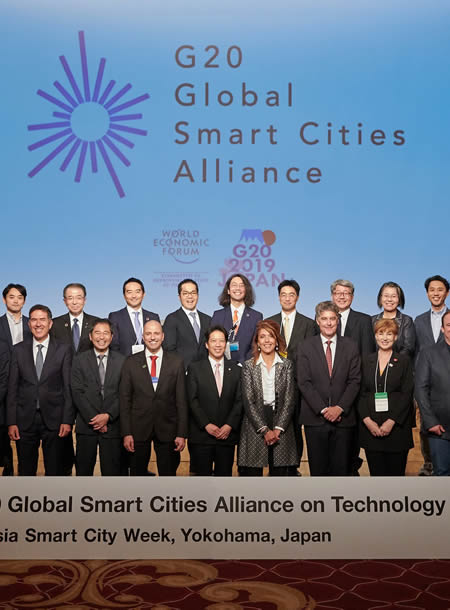
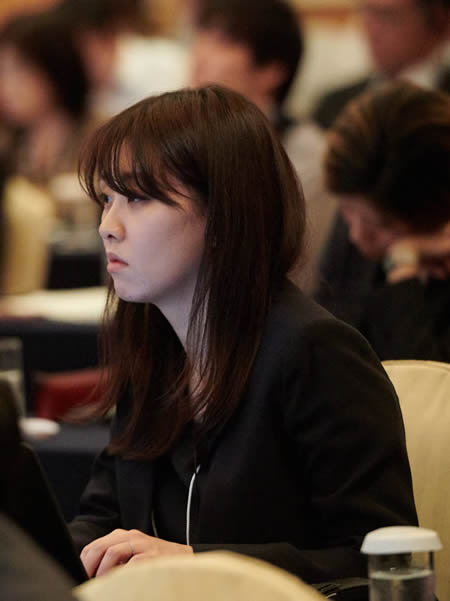
Photos: The G20 Global Smart Cities Alliance launch event in Yokohama, Japan. 11 October 2019.
Yokohama, Japan, 11 October 2019 - Fifteen of the world’s leading city networks and technology governance organizations announced today a new partnership. The “G20 Global Smart Cities Alliance on Technology Governance” will create global norms and policy standards for the use of connected devices in public spaces. It is the most significant and most ambitious undertaking to advance the responsible and ethical use of smart city technologies on a global level.
Smart city technologies can help decrease traffic congestion, combat crime, improve resilience during natural disasters, and reduce greenhouse emissions. Without proper governance, these technologies pose a significant risk, notably to privacy and security. The Global Smart Cities Alliance will develop, pilot, and collectively implement new global policy standards. It would ensure the safe and ethical use of data collected in public places.
“Our cities stand at a crossroads. Rapid urbanization threatens to paralyze local economies and undermine the quality of life,” said Jeff Merritt, Head of IoT, Robotics, and Smart Cities at the World Economic Forum. “Smart city technologies offer huge promise, but they can be a Pandora’s box. Today’s announcement is a critical first step to accelerate global best practices, mitigate risks, and foster greater openness and public trust regarding the collection of data in public spaces.”
Established in June 2019 in conjunction with the G20 Summit in Osaka, Japan, the Alliance comprises fifteen of the world’s leading city networks and technology governance organizations. The partners represent more than 200,000 cities and local governments, leading companies, start-ups, research institutions, and civil society organizations. The World Economic Forum serves as the secretariat.
“The advancement of smart cities and communities is critical to realizing Japan’s vision for Society 5.0. It is also essential to addressing the world’s most pressing challenges. These challenges include climate change and inclusive economic growth,” said Koichi Akaishi, Vice Minister for Science, Technology, and Innovation for the Cabinet Office of the Government of Japan. “The Government of Japan is proud to have championed this initiative as part of our G20 presidency. We hope that cities will pledge support for the Alliance and participate in its activities to cooperate and form shared global principles in the future.”
Working together with municipal, regional, and national governments, private-sector partners, and city residents, the Global Smart Cities Alliance, has committed to co-design and roll out a first-of-its-kind global policy framework on smart city technologies in advance of the 2020 G20 Summit in Riyadh, Saudi Arabia. The first policy design workshops with city leaders will take place in conjunction with the Smart City Expo World Congress in Barcelona, Spain, in November.
• The Global Smart Cities Alliance’s founding set of institutional partners include:
- The presidents and host nations of the Group of 20 (G20) in 2019 and 2020;
- Japan and the Kingdom of Saudi Arabia;
- The Smart City Mission of India;
- Cities for All;
- Cities Today Institute;
- Commonwealth Local Government Forum;
- Commonwealth Sustainable Cities Network;
- Connected Places Catapult;
- Digital Future Society;
- ICLEI - Local Governments for Sustainability;
- International Telecommunication Union;
- Open and Agile Smart Cities;
- Smart City Expo World Congress;
- United Cities and Local Governments;
- What Works Cities;
- World Economic Forum; and
- World Enabled.
|GlobalGiants.Com|







Edited & Posted by the Editor | 4:16 PM | View the original post
October 9, 2019
World Economic Forum publishes Global Competitiveness Report 2019
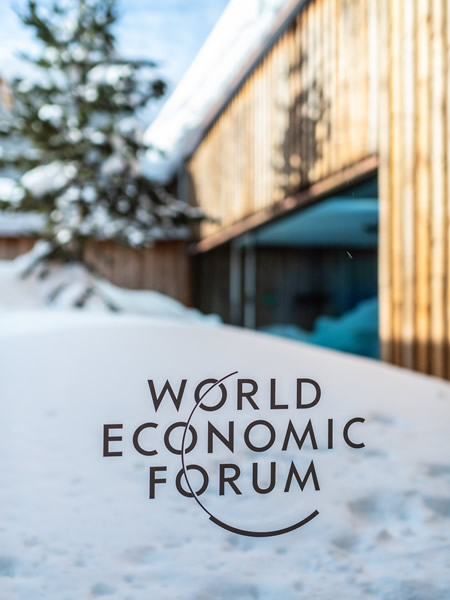
Photo: Impressions at the Annual Meeting 2019 of the World Economic Forum in Davos, 19 January 2019. Image provided by & Copyright © World Economic Forum / Mattias Nutt. [File Photo]
Geneva, Switzerland, 9 October 2019 - Ten years on from the global financial crisis, the global economy remains locked in a cycle of low or flat productivity growth despite the injection of more than $10 trillion by central banks. While these unprecedented measures were successful in averting a deeper recession, they are not enough to catalyze the allocation of resources towards productivity-enhancing investments in the private and public sectors. The Global Competitiveness Report 2019, published today, points to the path forward.
The Report, launched in 1979, provides an annual assessment of the drivers of productivity and long-term economic growth. The World Economic Forum prepares the Report on the bases of the Global Competitiveness Index (GCI), which maps the competitiveness landscape of 141 economies through 103 indicators organized into 12 pillars. These pillars are Institutions; Infrastructure; ICT adoption; Macroeconomic stability; Health; Skills; Product market; Labour market; Financial system; Market size; Business dynamism; and Innovation capability. For each indicator, the index uses a scale from 0 to 100, and the final score shows how close an economy is to the ideal state or “frontier” of competitiveness.
With a score of 84.8 (+1.3), Singapore is the world’s most competitive economy in 2019. The United States remains the most competitive large economy in the world, coming in at a second place. Hong Kong SAR (3rd), Netherlands (4th), and Switzerland (5th) round up the top five. The average across the 141 economies covered is 61 points, almost 40 points to the frontier. This global competitiveness gap is of even more concern as the global economy faces the prospect of a downturn. The changing geopolitical context and rising trade tensions are fuelling uncertainty and could precipitate a slowdown. However, some of this year’s better performers in the GCI appear to be benefiting from the trade feud through trade diversion, including Singapore (1st) and Viet Nam (67th), the most improved country in this year’s index.
The report documents emerging areas of promising policies, reforms, and incentives to build more sustainable and inclusive economies. The Report recommends a transition to a greener economy and suggests four critical areas of action: engage in openness and international collaboration, update carbon taxes and subsidies, create incentives for R&D, and implement green public procurement.
The Report also recommends: increase equality of opportunity, encourage fair competition, update tax systems, modernize social protection measures, and foster competitiveness-enhancing investments.
The United States (2nd overall) is the leader in Europe and North America. The United States remains an innovation powerhouse, ranking 1st on the Business dynamism pillar and 2nd on Innovation capability. The Netherlands (4th), Switzerland (5th), Germany (7th), Sweden (8th), the United Kingdom (9th), and Denmark (10th) follow the USA. Among other large economies in the region, Canada is 14th, France 15th, Spain 23rd, and Italy 30th. The most improved country is Croatia (63rd).
In South Asia, India, in 68th position, loses ground in the rankings despite a relatively stable score, mostly due to faster improvements of several countries previously ranked lower. Sri Lanka (84th), Bangladesh (105th), Nepal (108th), and Pakistan (110th) follow India.
|GlobalGiants.Com|







Edited & Posted by the Editor | 1:05 PM | View the original post
October 3, 2019
US-India Trade "Surging" Amid Torrid Times, Global Leaders Tell World Economic Forum's India Economic Summit 2019
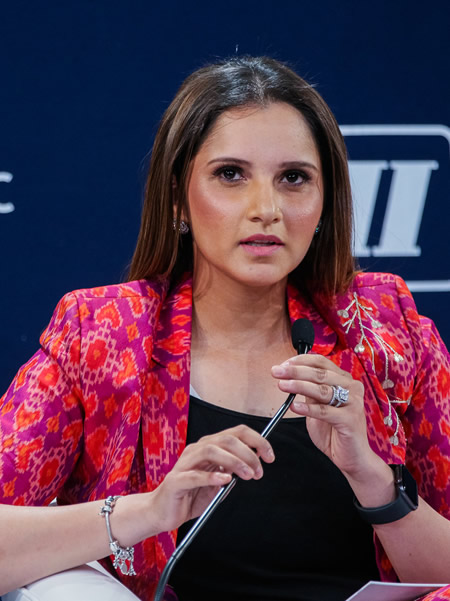
Photo: Sania Mirza, Sportsperson and UN Women Goodwill Ambassador for South Asia, India; Cultural Leader, speaking during the Session “Opening Plenary” at the India Economic Summit 2019 in New Delhi, India. 03 October 2019. Image provided by & copyright © World Economic Forum / Benedikt von Loebell.
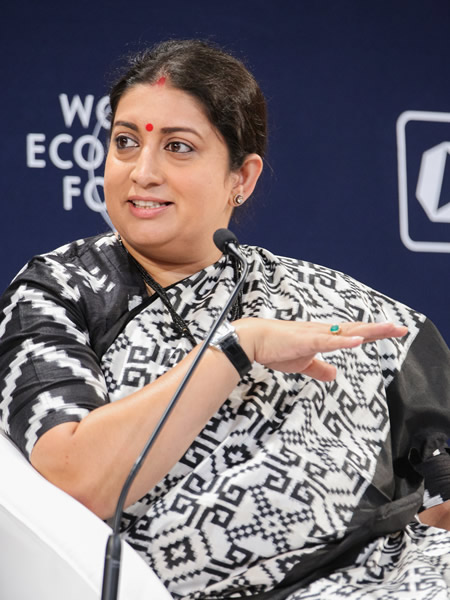
Photo: Smriti Zubin Irani, Minister of Women and Child Development, and Textiles, India, speaking during the Session “Inspiring LeadHers, Aspiring Outcomes” at the India Economic Summit 2019 in New Delhi, India. 03 October 2019. Image provided by & copyright © World Economic Forum / Benedikt von Loebell.
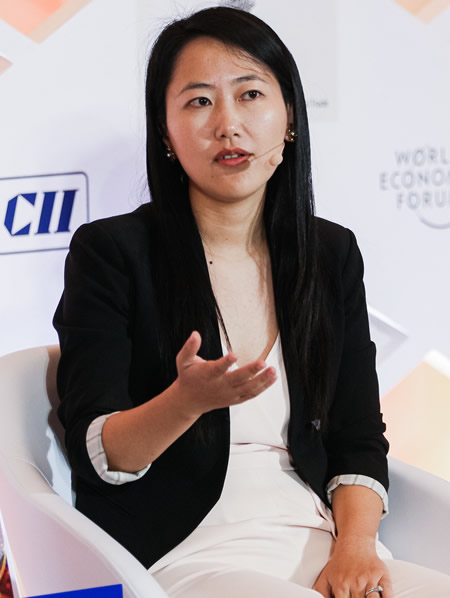
Photo: Sarah Zhang Jiachen, Founder and Chief Executive Officer, Guangzhishu, speaking during the Session “India’s Tech Leap” at the India Economic Summit 2019 in New Delhi, India. 03 October 2019. Image provided by & copyright © World Economic Forum / Benedikt von Loebell.
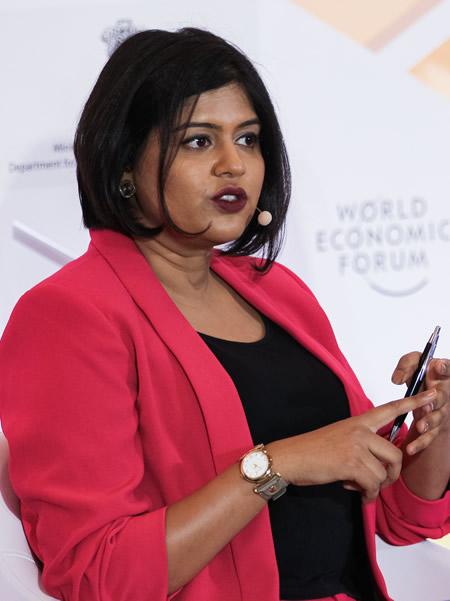
Photo: Devina Gupta, Anchor, BBC World News, India, speaking during the Session “India’s Tech Leap” at the India Economic Summit 2019 in New Delhi, India. 03 October 2019. Image provided by & copyright © World Economic Forum / Benedikt von Loebell.
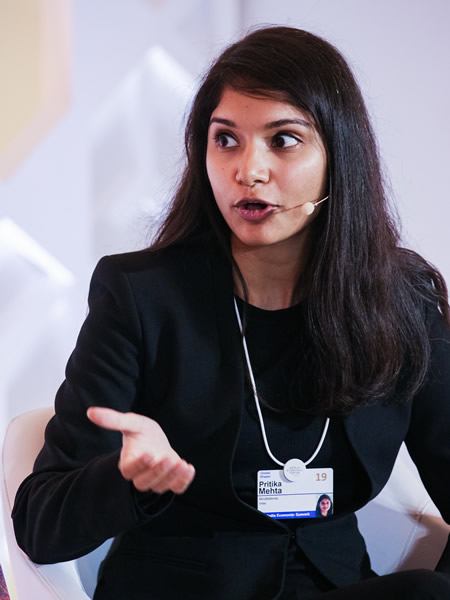
Photo: Pritika Mehta, Global Shaper, Chandigarh Hub, India, speaking during the Session “India’s Tech Leap” at the India Economic Summit 2019 in New Delhi, India. 03 October 2019. Image provided by & copyright © World Economic Forum / Benedikt von Loebell.
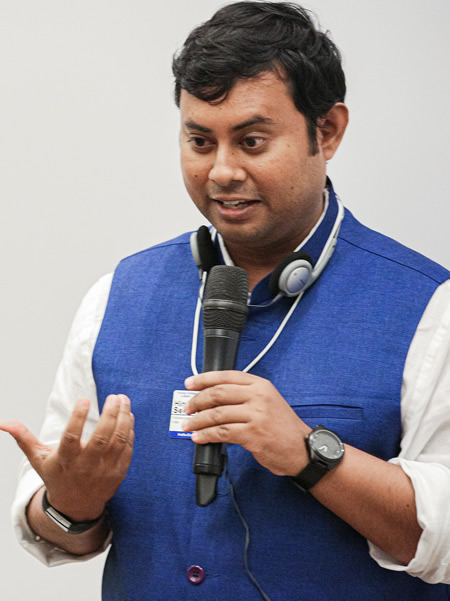
Photo: Hindol Sengupta, Editor-at-Large, Fortune India; Young Global Leader, speaking during the Session “Depopularizing Populism” at the India Economic Summit 2019 in New Delhi, India. 03 October 2019. Image provided by & copyright © World Economic Forum / Benedikt von Loebell.
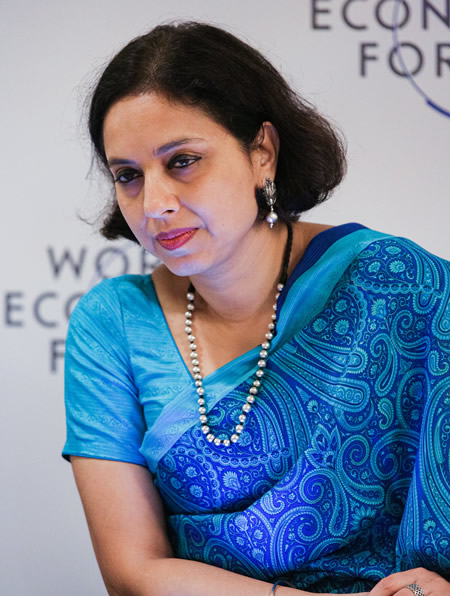
Photo: Suhasini Haidar, Diplomatic Editor, and Deputy Resident Editor, The Hindu, India, speaking during the Session “The Infrastructure Enigma” at the India Economic Summit 2019 in New Delhi, India. 03 October 2019. Image provided by & copyright © World Economic Forum / Benedikt von Loebell.
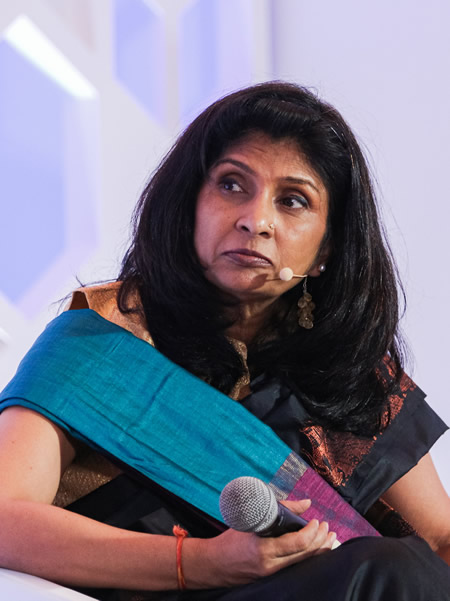
Photo: Vani Kola, Founder, and Managing Director, Kalaari Capital, India, speaking during the Session “Bigger, Faster, Better?” at the India Economic Summit 2019 in New Delhi, India. 03 October 2019. Image provided by & copyright © World Economic Forum / Benedikt von Loebell.
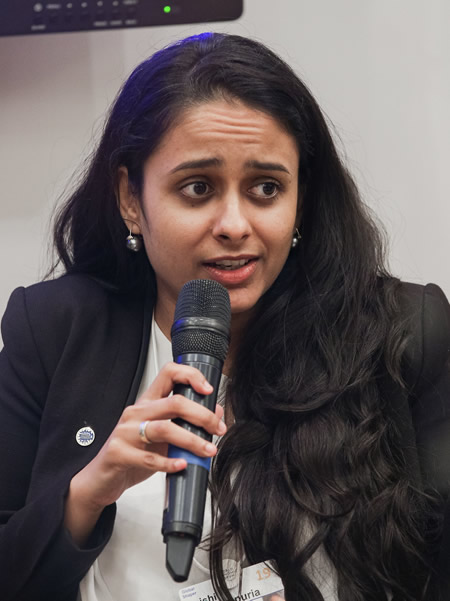
Photo: Amishi Parasrampuria, Global Shaper, Mumbai Hub, India, speaking during the Session “Maxing Out Consumption” at the India Economic Summit 2019 in New Delhi, India. 04 October 2019. Image provided by & copyright © World Economic Forum / Benedikt von Loebell.
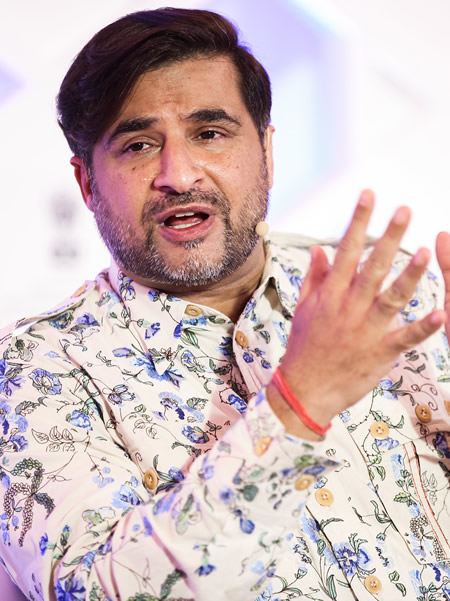
Photo: Suvir Saran, Chef, and Author, India; Cultural Leader, speaking during the Session “Connecting Cultures” at the India Economic Summit 2019 in New Delhi, India. 04 October 2019. Image provided by & copyright © World Economic Forum / Benedikt von Loebell.
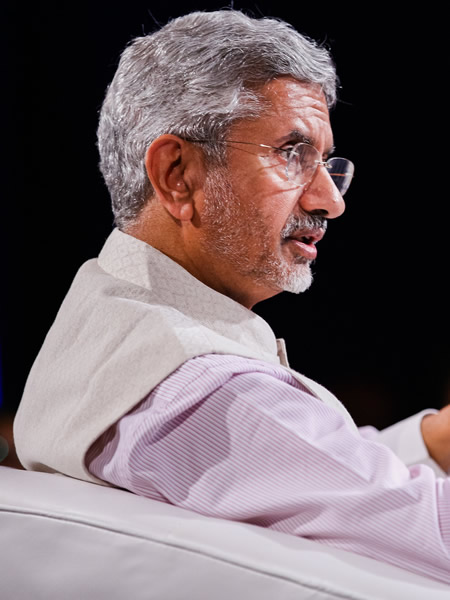
Photo: Subrahmanyam Jaishankar, Minister of External Affairs of India, speaking during the Session “An Insight, An Idea with Subrahmanyam Jaishankar” at the India Economic Summit 2019 in New Delhi, India. 04 October 2019. Image provided by & copyright © World Economic Forum / Benedikt von Loebell.
New Delhi, India, 03 October 2019 - Leaders from the world’s two largest and oldest democracies played down talk of “torrid times” over trade at the opening day of the 2019 India Economic Summit in Delhi. Instead, they noted that relations between the two nations are robust and on the up.
“The torrid times in our relations could also be a torrid love affair,” declared Piyush Goyal, Minister of Commerce and Industry and Minister of Railways of India, at the summit. “Relations between the Indian government and the US government, at our level and the people-to-people level, are better than ever before.”
Goyal noted that trade between India and the US is robust and growing. It is happening amid rising trade tensions between China and the United States and the ripple effect of that on the global economy.
Goyal said, in the last year, imports from the US to India have grown 30%, while exports from India to the US have increased by 20%.
Wilbur Ross, Secretary of Commerce of the United States, responded to the criticism that no trade deal resulted from a meeting in September between India and the US. Ross said he saw no reason why we could not reach one soon.
“Neither government said there would a trade deal in five minutes,” he noted. “I think that was just speculation. We do think there is no fundamental reason why there can’t be one pretty quickly.” “Now that the election is over, and Prime Minister Modi has a strong position in the parliament, it should be a lot easier to take decisive action,” he said.
The relationship between India and the US has the potential to be one of the greatest of the 21st century, but global leaders speaking at the summit acknowledged there would be challenges ahead. India has an important role to play in the geopolitics of the region, and that positioning will inevitably lead to a sensitive question as to how to develop its relationship with China.
“India will have to decide for themselves their relationship with China in a larger context. India and China are trading partners, they are neighbors, and they have a huge population,” said Sunil Bharti Mittal. Mittal is Chairman of Bharti Enterprises. “India will take this advice carefully, but a decision will have to be taken critically by India,” he said. “My view is they should be in play.”
With US companies being encouraged to shift manufacturing outside China, there is an opportunity for a fundamental recasting of global supply chains. Indian industry is ready to take on the challenge to increase its competitiveness, said Vikram Kirloskar. Kirloskar is President of the Confederation of Indian Industry (CII) and Vice-Chairman of Toyota Kirloskar Motor.
“Over the last 20 years, we have become part of the global supply chain. To a large extent, a lot of the automotive components we are exporting are fairly competitive now,” said Kirloskar. “I think we are ready to increase capacity more, and we need the domestic market to increase as well as exports. For us, regional cooperation is also crucial.”
The World Economic Forum’s 33rd India Economic Summit is taking place in New Delhi from 3-4 October under the theme “Innovating for India: Strengthening South Asia, Impacting the World.” The two-day meeting will convene more than 800 leaders from the government, the private sector, academia, and civil society. The aim is to accelerate the adoption of Fourth Industrial Revolution technologies throughout South Asia and make the most of the region’s distinctive demographic dividends.
|GlobalGiants.Com|







Edited & Posted by the Editor | 12:25 PM | View the original post
August 10, 2019
The World Economic Forum will host the 2019 India Economic Summit in New Delhi from 3 to 4 October.
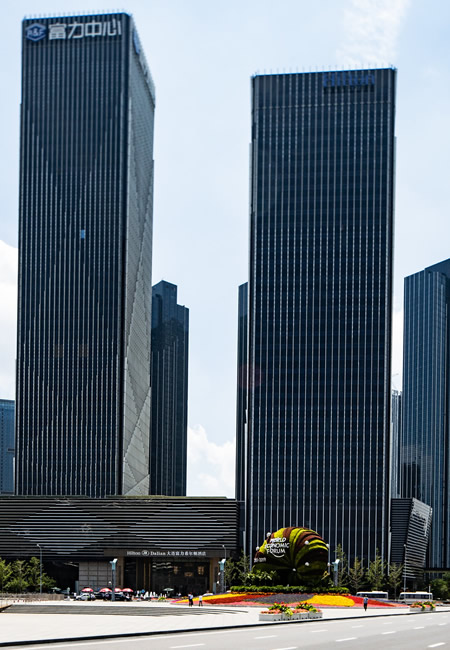
Photo: Dalian International Conference Centre before the start of the World Economic Forum - Annual Meeting of the New Champions in Dalian, People’s Republic of China 2019. Image provided by & Copyright © World Economic Forum / Greg Beadle. [File Photo]
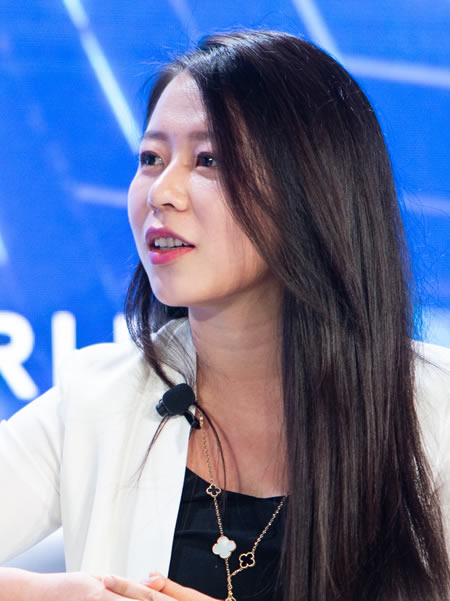
Photo: Zhang Lu, Founding and Managing Partner, Fusion Fund, USA; Young Global Leader, captured during the Session “How China Shapes the Future of Finance” at the World Economic Forum - Annual Meeting of the New Champions in Dalian, People’s Republic of China, 1 July 2019. Image provided by & Copyright © World Economic Forum / Sikarin Fon Thanachaiary. [File Photo]
Geneva, Switzerland, 9 August 2019 - The World Economic Forum in collaboration with the Confederation of Indian Industry (CII) will host this year’s India Economic Summit in New Delhi from 3 to 4 October.
The World Economic Forum would conduct the summit under the theme “Innovating for India: Strengthening South Asia, Impacting the World.” The summit will build on its more than three decades of success and explore some of the critical issues facing the region.
Participants will discuss improving technology governance, developing infrastructure, ensuring job creation and skill development, advancing environmental sustainability, and ensuring equitable and inclusive growth for all.
The India Economic Summit will welcome over 800 participants from business, politics, academia, civil society, international organizations, arts and culture, media and members of the Forum’s communities, including Social Entrepreneurs, Global Shapers and Young Global Leaders.
The summit will address strategic issues of regional significance under four thematic pillars:
• The International Affairs Reality - Geopolitical shifts and the complexity of our global system
• The New Social System - Inequality, inclusive growth, health and nutrition
• The New Ecological System - Environment, pollution, and climate change
• The New Technological System - The Fourth Industrial Revolution, science, and innovation and entrepreneurship
“This year marks 35 years of our engagement in India,” said Viraj Mehta, World Economic Forum’s Head of Regional Agenda, India and South Asia.
Mr. Mehta disclosed that the summit would hear the government’s vision of making India a $5 trillion economy. The summit will also focus on South Asia and ASEAN. It would discuss how the two regions can enhance economic collaboration and bring the global best practices to the area.
Source: World Economic Forum
|GlobalGiants.Com|







Edited & Posted by the Editor | 9:44 AM | View the original post
June 18, 2019
United Nations and the World Economic Forum Sign Strategic Partnership Framework
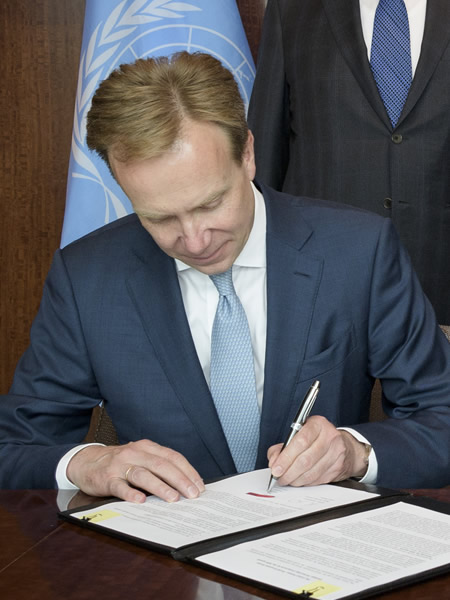
Photo: Borge Brende, President of the World Economic Forum, signs the Memorandum of Understanding between the United Nations and the World Economic Forum on the Strategic Partnership Framework for the 2030 Agenda. 13 June 2019. United Nations, New York. UN Photo/Manuel Elias.
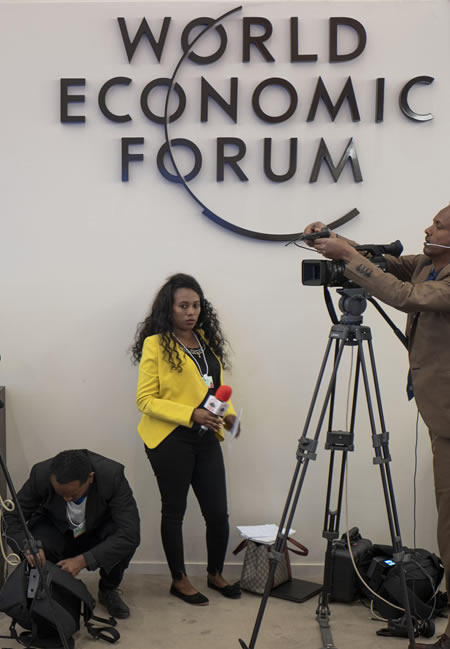
Photo: Preparing for a live reporting from the Annual Meeting 2019 of the World Economic Forum in Davos, 22 January 2019. Image provided by & copyright © World Economic Forum / Valeriano Di Domenico. [File Photo]
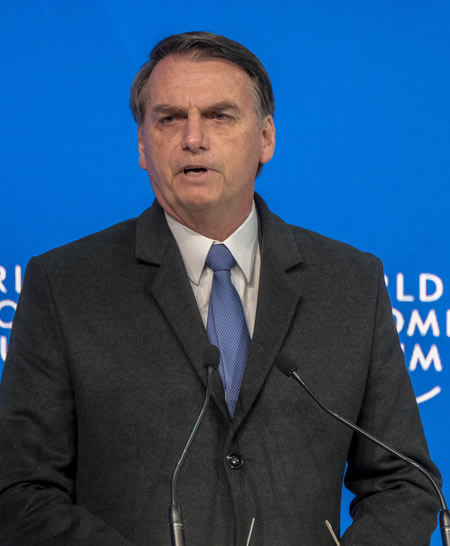
Photo: Jair Bolsonaro, President of Brazil, speaking at the Annual Meeting 2019 of the World Economic Forum in Davos, 22 January 2019. Image provided by & copyright © World Economic Forum / Walter Duerst. [File Photo]
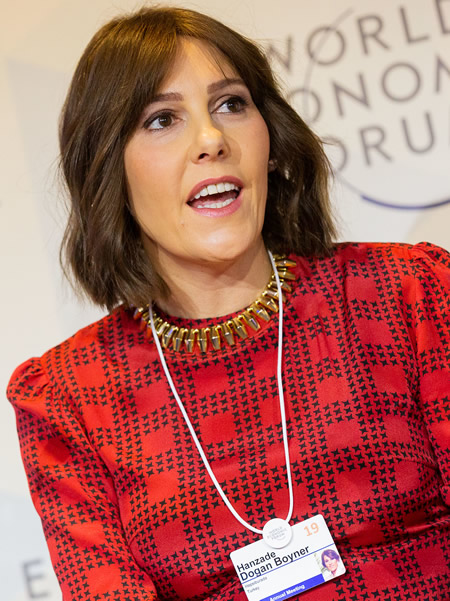
Photo: Hanzade Dogan Boyner, Chairwoman, Hepsiburada, Turkey, speaking at the Annual Meeting 2019 of the World Economic Forum in Davos, 22 January 2019. Image provided by & copyright © World Economic Forum / Christian Clavadetscher. [File Photo]
New York, USA, 18 June 2019 - The World Economic Forum and the United Nations have just signed a Strategic Partnership Framework outlining areas of cooperation to deepen institutional engagement and jointly accelerate the implementation of the 2030 Agenda for Sustainable Development. The Framework was drafted based on a mapping of the existing collaboration between the two institutions. It would enable a more strategic and coordinated approach towards delivering impact.
The UN-Forum Partnership was signed in a meeting held at United Nations headquarters between UN Secretary-General António Guterres and World Economic Founder and Executive Chairman Klaus Schwab.
“Meeting the Sustainable Development Goals is essential for the future of humanity. The World Economic Forum is committed to supporting this effort, and working with the United Nations to build a more prosperous and equitable future,” said Schwab.
“The new Strategic Partnership Framework between the United Nations and the World Economic Forum has great potential to advance our efforts on critical global challenges and opportunities, from climate change, health and education to gender equality, digital cooperation and financing for sustainable development. Rooted in UN norms and values, the Framework underscores the invaluable role of the private sector in this work - and points the way toward action to generate shared prosperity on a healthy planet while leaving no one behind,” said Guterres.
The Strategic Partnership Framework will focus on the following areas:
• Financing the 2030 Agenda - Mobilize systems and accelerate finance flows toward the 2030 Agenda and the UN Sustainable Development Goals, taking forward solutions to increase long-term SDG investments.
• Climate Change - Achieve clear, measurable, and public commitments from the private sector to reach carbon neutrality by 2050. Help create public-private platforms in critical high-emitting areas and scale up the services required to adapt to the impacts of climate change.
• Health - Support countries achieve good health and well-being for all, within the context of the 2030 Agenda, focusing on significant emerging global health threats that require stronger multistakeholder partnership and action.
• Digital Cooperation - Meet the needs of the Fourth Industrial Revolution while seeking to advance global analysis, dialogue, and standards for digital governance and digital inclusiveness.
• Gender Equality and the Empowerment of Women - Foster partnerships and coalitions at all levels for full participation and equal opportunities of women . Promote equal pay to women for work of fair value across sectors and occupations as well as within them.
• Education and Skills - Promote public-private partnerships to address global reskilling and lifelong learning for the future requirements for work, and empower youth with competencies for life and decent work.
The leadership across the United Nations will engage in and utilize the different platforms provided by the World Economic Forum to advance impact in the above areas. Both institutions will annually review the partnership to streamline collaboration further, take stock of results, and identify additional areas to invest in efforts jointly.
Source: World Economic Forum
|GlobalGiants.Com|







Edited & Posted by the Editor | 1:51 PM | View the original post
January 25, 2019
UN Secretary-General: Fragmented Response to Global Risk a ‘Recipe For Disaster’
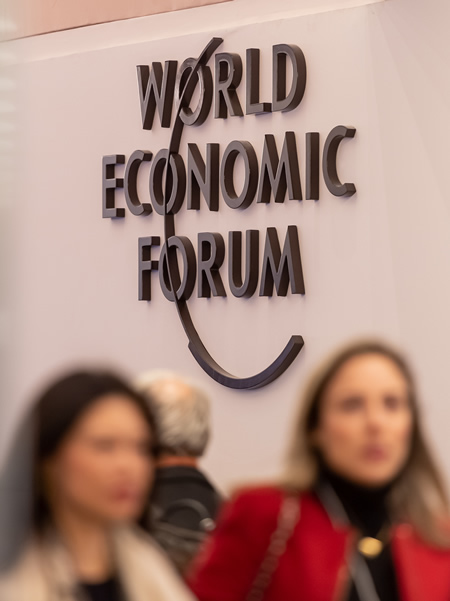
Photo: Impressions from the Annual Meeting 2019 of the World Economic Forum in Davos, January 22, 2019. Image provided by & copyright © World Economic Forum / Sandra Blaser.
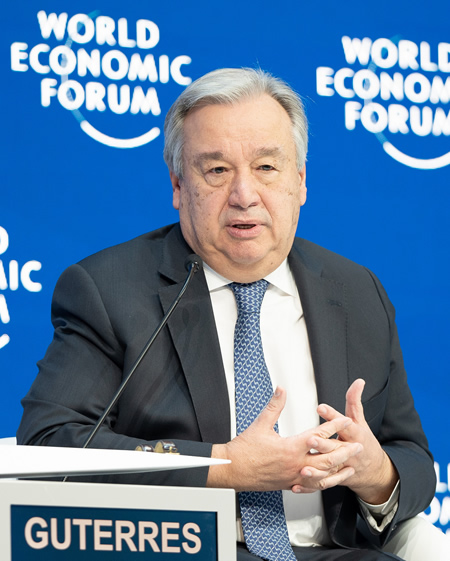
Photo: Antonio Guterres, Secretary-General, United Nations, New York, captured during the Session “Special Address by António Guterres, Secretary-General of the United Nations” at the Annual Meeting 2019 of the World Economic Forum in Davos, January 24, 2019. Congress Centre - Congress Hall. Image provided by & copyright © World Economic Forum / Sikarin Fon Thanachaiary.
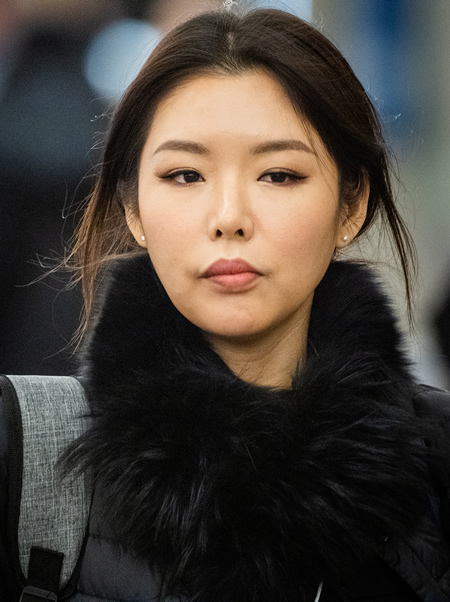
Photo: A participant at the Annual Meeting 2019 of the World Economic Forum in Davos, January 21, 2019. Image provided by & copyright © World Economic Forum / Boris Baldinger.
Davos-Klosters, Switzerland, 24 January 2019. — “If I have to select one sentence to describe the state of the world, I would say we are in a world in which global challenges are more integrated, and the responses are more and more fragmented. If these are not reversed, it is a recipe for disaster,” warned UN Secretary-General António Guterres in his address at the World Economic Forum Annual Meeting today.
Outlining the current risk landscape, one characterized by the megatrends of climate change, migration, digitalization, and protracted conflict, the UN Secretary-General identified climate change as the most critical systemic threat soon and one, he said, “we are losing the race on.”
“Climate change is running faster than we are and we have this paradox,” Guterres observed, “The reality is proving to be worse than what scientists foresaw, and all the large indicators show that, and we are moving dramatically into runaway climate change if we are not able to stop it.”
Pointing to growing complexity in the international community and global trade, Guterres argued that, geopolitically, the world is in a state of turbulent flux. “We no longer live in a bipolar or unipolar world, but we are not yet in a multipolar world; we are in a kind of chaotic situation of transition,” he told political, and business leaders gathered in Davos. “The relationship between the three most important powers, Russia, the US and China, has never been as dysfunctional as it is today and this is true for the economy, and also true in the paralysis of the UN Security Council.”
To address the complexity and interconnectedness of the myriad risks ahead, the real frustrations of the “rust belts of the world” and a trend of “illiberal democracies,” the UN head advocated only one approach. “I am a multilateralist; I am deeply convinced there is no other way to deal with global problems but with global responses. It is also not enough to vilify those that disagree and call them nationalists or populists,” he stressed: “We need to understand the root causes of why large sectors of the population in different parts of the world today disagree with us - and we need to address those root causes and show these people that we care for them.”
Tackling global crises - from combating climate change to developing a set of rules on the “weaponization of AI” - cannot be achieved by any one country, but should be addressed collectively by governments, the private sector, civil society, and academia urged Guterres.
Representing an organization of 100 million people, operating in 40 countries and mobilizing some $15 billion, Guterres said that, in 2019, the UN will be pushing for a surge in diplomacy for peace in some of the world’s hotspots - including Yemen, Syria and South Sudan - and higher spending on mitigating climate change. As part of bureaucratic reform, he added that the UN expects to achieve internal gender parity by 2028.
Turning to the disruptive and transformative impacts of the Fourth Industrial Revolution, Guterres suggested engaging more financial institutions to invest in developing countries and promote social and green bonds, dealing with the massive restructuring of the labor force and redesigning our education systems.
“We need to mobilize governments, the business community and civil society to understand what kind of impact the Fourth Industrial Revolution is going to have in the next decade and what kind of measures can we start taking, such as in education,” he mused. “It doesn’t matter how many things you learn but how you learn to learn because you will be doing many different things.”
The World Economic Forum Annual Meeting brings together more than 3,000 global leaders from politics, government, civil society, academia, the arts, and culture as well as the media. It engages some 50 heads of state and government, more than 300 ministerial-level government participants, and business representation at the chief executive officer and chair level. Convening under the theme, Globalization 4.0: Shaping a Global Architecture in the Age of the Fourth Industrial Revolution, participants are focusing on new models for building sustainable and inclusive societies in a plurilateral world.
Source: World Economic Forum
|GlobalGiants.Com|
There is a contradiction in the world today: global challenges are interlinked, but our response is fragmented. We need more integrated global action to repair broken trust and uphold dignity for all. My intervention at #WEF19 with @borgebrende: https://t.co/1n8s9FB1do pic.twitter.com/Q3Xo79XJOm
— António Guterres (@antonioguterres) January 24, 2019







Edited & Posted by the Editor | 8:05 AM | View the original post
January 22, 2019
Nobel Peace Prize Laureate Kailash Satyarthi and Jane Goodall at Open Forum in Davos
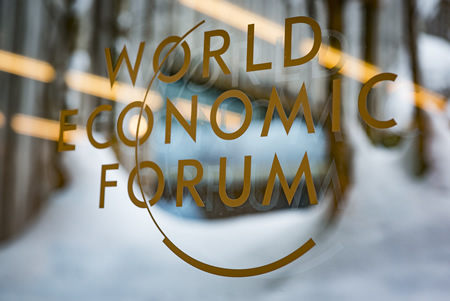
Photo: The Forums Logo is seen in this Picture taken at the Annual Meeting 2019 of the World Economic Forum in Davos, January 20, 2019. Image provided by & copyright © World Economic Forum / Benedikt von Loebell.
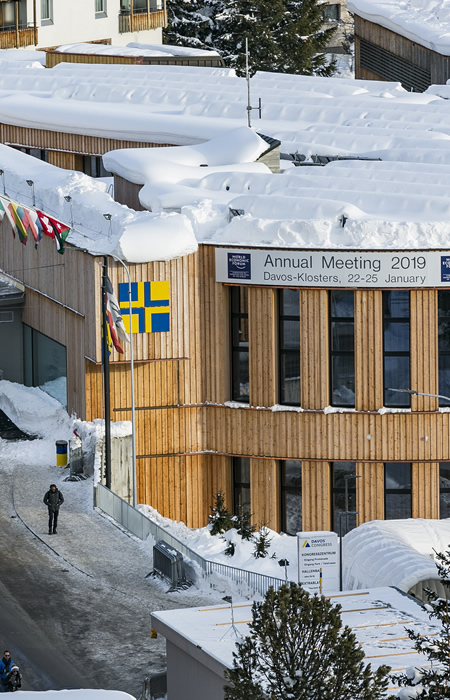
Photo: Impressions from the Annual Meeting 2019 of the World Economic Forum in Davos, January 20, 2019. Image provided by & copyright © World Economic Forum / Benedikt von Loebell.
Davos-Klosters, Switzerland, 21 January 2019 - Sessions on escaping extinction and tackling plastic pollution plus the Nobel Peace Prize Laureate Kailash Satyarthi’s special screening of the documentary, The Price of Free, which portrays the rescue of 80,000 child factory workers in India, are among the events open to the public, on a first come, first served basis at the Open Forum Davos 2019.
Fareed Zakaria, the host of CNN’s Fareed Zakaria GPS, will be joined in conversation with Jane Goodall during which they will discuss her life’s journey through the world’s last forests and her work with great apes, humanity’s closest relatives.
The extreme swimmer from Davos, Ernst Bromeis, will discuss his journeys across the waters of Europe and what it takes to protect our planet’s most important resource. There will also be an exceptional performance and dialogue with a quartet of the Sphinx Virtuosi chamber orchestra, which comprises some of the most talented young African-American and Latino soloists in the United States, highlighting how increasing diversity in classical music benefits everyone.
The Open Forum Davos, now in its 17th year and with a fresh new look, will open its doors to the public from 22 to 25 January in Davos, Switzerland. Leading personalities from business, government, academia, and civil society, as well as young people, will discuss and interact with the Swiss public on critical - and, at times, controversial - subjects, opening a unique window onto the most challenging debates of our time.
Panelists at this year’s Open Forum Davos comprise public figures, chief executive officers, representatives from civil society, experts and academics from Switzerland and around the world, including:
· Jane Goodall, Founder, Jane Goodall Institute
· Peter Thomson, United Nations Secretary-General’s Special Envoy for the Ocean, New York
· Marco Lambertini, Director-General, WWF International
· Denis Mukwege, Founder, Panzi Hospital and Foundation
· Hindou Oumarou Ibrahim, President, Association for Indigenous Women and Peoples of Chad
· Kailash Satyarthi, Founder, Kailash Satyarthi Children’s Foundation
· Pascale Baeriswyl, State Secretary for Foreign Affairs of Switzerland
· Heather Koldewey, Fellow, National Geographic Society
· Ernst Bromeis, Water Ambassador, The Blue Miracle
· Marietje Schaake, Member of the European Parliament, European Union
· Roger Köppel, Member of the National Council, Swiss Parliament
· Ricken Patel, Founder and Chief Executive Officer, Avaaz.org
· Rachel Haas, Managing Director, NO MORE
· Martina Hirayama, State Secretary for Education and Research and Innovation of Switzerland
· Sarah bint Yousif Al Amiri, Minister of State for Advanced Sciences of the United Arab Emirates
· Laurie Santos, Professor of Psychology; Head, Silliman College, Yale University
· Karan Johar, Head, Dharma Productions, Mumbai
· Cristiana Pasca Palmer, Executive Secretary, Convention on Biological Diversity
· Jeremy Farrar, Director, Wellcome Trust
Open Forum Programme
Tuesday 22 January
09.00 - 10.00 Water for Life
12.30 - 14.00 Plastic Pollution: An End in Sight?
18.30 - 20.00 Averting “Peak Europe”
Wednesday 23 January
09.00 - 10.30 Escaping Extinction
13.00 - 14.00 An Insight, An Idea with Jane Goodall
18.30 - 20.00 Violence against Women
Thursday 24 January
09:00 - 10:00 An Encounter with the Sphinx Virtuosi
12.30 - 14.00 Loneliness: An Epidemic?
18.30 - 20.00 The Price of Free
Friday 25 January
09.00 - 10.30 Bridging Science with Society
The Open Forum will be held at the Swiss Alpine Mittelschule, Guggerbachstrasse 3, Davos Platz, Switzerland.
Source: World Economic Forum
|GlobalGiants.Com|
These are the world's 20 most dynamic cities https://t.co/CoL2xODxG4 #society #future #wef19 pic.twitter.com/nmqdRUzFzR
— World Economic Forum (@wef) January 21, 2019
Meet the Co-Chairs of Davos 2019 @akirakakapo @satyanadella @JuanDavidAristi @NouraBerrouba @JuliaLuscombe https://t.co/cWfEnddkSI #wef19 pic.twitter.com/4h184MH8Gc
— World Economic Forum (@wef) January 21, 2019







Edited & Posted by the Editor | 2:14 AM | View the original post
January 23, 2018
Pope Tells Participants Human-Centric Economy Is ‘A Moral Imperative’ as 48th World Economic Forum Annual Meeting Gets Underway in Davos, Switzerland
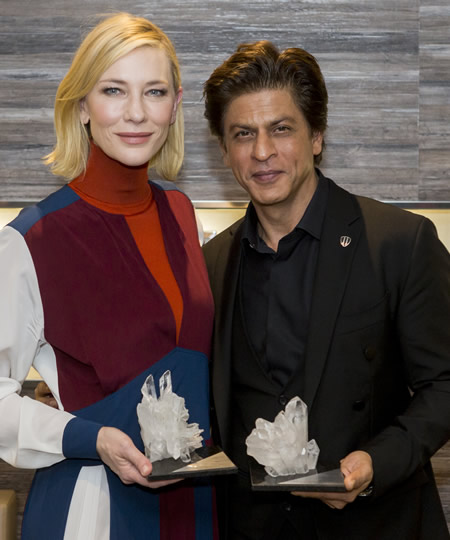
Photo: Cate Blanchett, Goodwill Ambassador, United Nations High Commissioner for Refugees (UNHCR), London, and Shah Rukh Khan, Actor, Red Chillies Entertainment, India, after the “The 24th Annual Crystal Awards Ceremony” at the Annual Meeting 2018 of the World Economic Forum in Davos, Switzerland, January 22, 2018. Image provided by & copyright © World Economic Forum / Benedikt von Loebell.
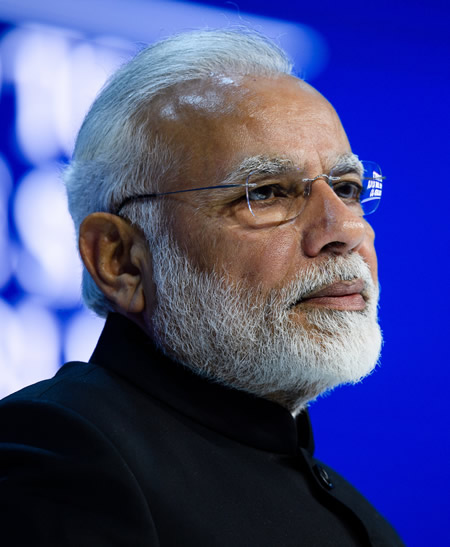
Photo: Narendra Modi, Prime Minister of India, speaking during the Opening Plenary at the Annual Meeting 2018 of the World Economic Forum in Davos, Switzerland, January 23, 2018. Image provided by & copyright © World Economic Forum / Manuel Lopez.
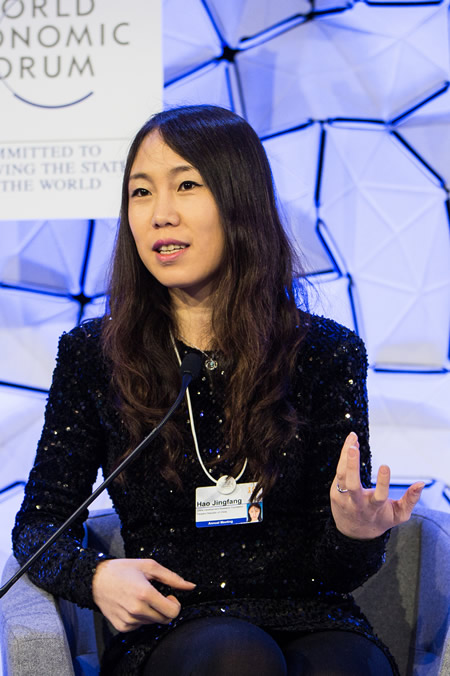
Photo: Hao Jingfang, Writer, China Development Research Foundation, People’s Republic of China, captured during the Session “The Power of Economic Narratives” at the Annual Meeting 2018 of the World Economic Forum in Davos, Switzerland, January 23, 2018. Image provided by & copyright © World Economic Forum / Sikarin Thanachaiary.
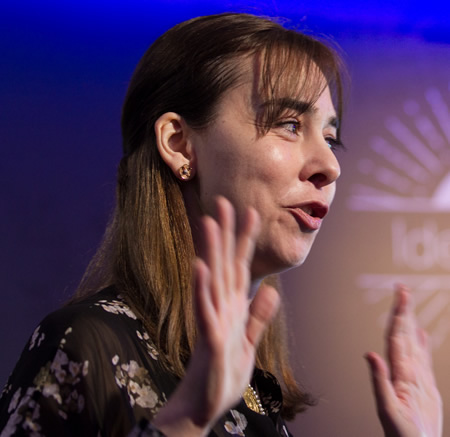
Photo: Dina Katabi, Andrew and Erna Viterbi Professor of Electrical Engineering and Computer Science, Massachusetts Institute of Technology (MIT), USA, speaking during the Session “Intelligent Cyber-Physical Systems for Health with Massachusetts Institute of Technology” at the Annual Meeting 2018 of the World Economic Forum in Davos, January 25, 2018. Image provided by & copyright © World Economic Forum / Greg Beadle.
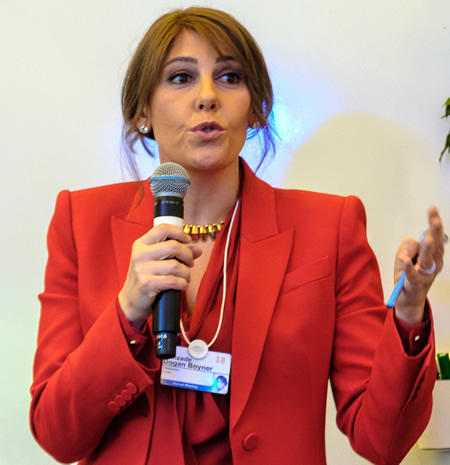
Photo: Hanzade Dogan Boyner, Chairwoman, Hepsiburada, Turkey, speaking during the Session: Online Consumer Marketplaces, at the Annual Meeting 2018 of the World Economic Forum in Davos, January 25, 2018. Image provided by & copyright © World Economic Forum / Walter Duerst.
Geneva, Switzerland, 23 January 2018 - His Holiness Pope Francis helped open the 48th World Economic Forum Annual Meeting with a special message, passionately calling on participants to overcome fragmentation between states and institutions and work together to facilitate more inclusive approaches in an increasingly globalized world.
In a speech delivered by Cardinal Peter Kodwo Appiah Turkson, Prefect of the Dicastery for Promoting Integral Human Development, Pope Francis said: “It is vital to safeguard the dignity of the human person, in particular by offering to all people real opportunities for integral human development and by implementing economic policies that favour the family.”
Echoing the theme of the meeting, Creating a Shared Future in a Fractured World, the Pope said, “The entrepreneurial world has enormous potential to effect substantial change by increasing the quality of productivity, creating new jobs, respecting labour laws, fighting against … corruption and promoting social justice.” He continued, “If we want a more secure future, one that encourages the prosperity of all, then it is necessary to keep the compass continually oriented towards ‘true north’,” represented by authentic values.
The World Economic Forum’s 48th Annual Meeting opens today in Davos-Klosters, Switzerland. More than 3,000 leaders from around the world are gathering in a collaborative effort to shape the global, regional and industry agendas, with a commitment to improve the state of the world. The meeting brings together governments, international organizations, business, civil society, cultural leaders, media, experts and the young generation, at the highest level and in representative ways.
|GlobalGiants.Com|







Edited & Posted by the Editor | 7:56 AM | View the original post
January 20, 2017
Preparing for Fourth Industrial Revolution Requires Deeper Commitments to Education
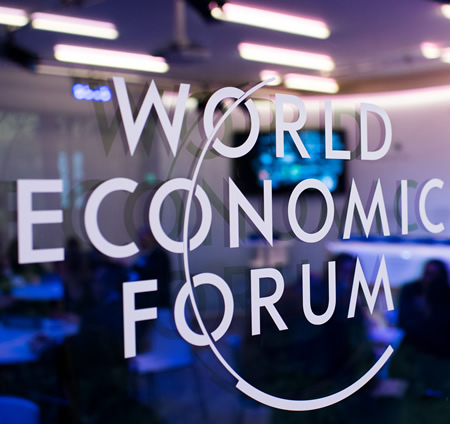

Photos: World Economic Forum Annual Meeting 2017, Davos, Switzerland. Images provided by & Copyright © World Economic Forum / Faruk Pinjo / Valeriano Di Domenico.
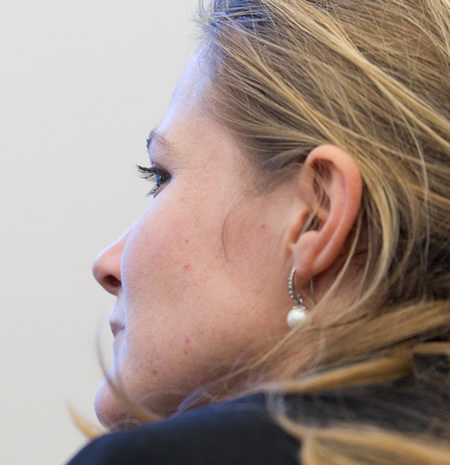
Photo: Interaction during the session: Davos Insights: Strengthening Systems for Global Collaboration, at the Annual Meeting 2017 of the World Economic Forum in Davos, Switzerland, January 20, 2017. Image provided by & copyright © World Economic Forum / Greg Beadle.
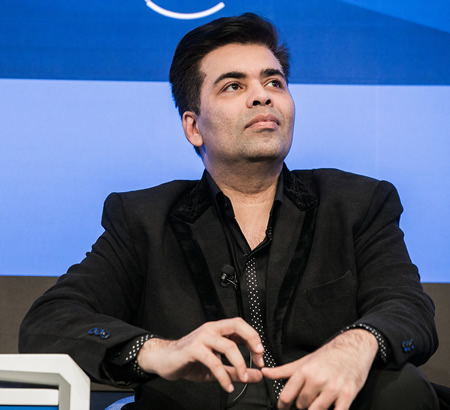
Photo: The New Lead Characters. Karan Johar, Head, Dharma Productions, India, at the Annual Meeting 2017 of the World Economic Forum in Davos, January 17, 2017. Image provided by & copyright © World Economic Forum / Jakob Polacsek.
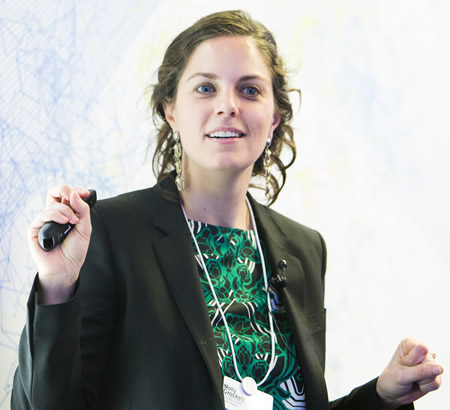
Photo: Ask About: The Psychology of Populism. Molly Crockett, Associate Professor of Experimental Psychology, University of Oxford, United Kingdom, at the Annual Meeting 2017 of the World Economic Forum in Davos, January 17, 2017. Image provided by & copyright © World Economic Forum / Sikarin Thanachaiary.
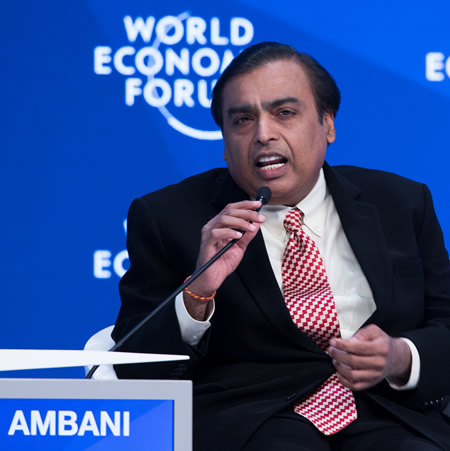
Photo: Preparing for the Fourth Industrial Revolution. Mukesh D. Ambani, Chairman and Managing Director, Reliance Industries, India, “Preparing for the Fourth Industrial Revolution” Session at the World Economic Forum in Davos, January 17, 2017. Image provided by & copyright © World Economic Forum / Valeriano Di Domenico.
Davos-Klosters, Switzerland - January 20, 2017 — The accelerating pace of change driven by emerging technologies threatens to create wider income and opportunity gaps, warned business and technology leaders in a session on preparing for the Fourth Industrial Revolution on the opening day of the World Economic Forum Annual Meeting. “We are at a point where it is possible that technological development can accelerate and increase digital refugees,” warned Marc R. Benioff, Chairman and Chief Executive Officer of Salesforce in the US. Added Vishal Sikka, Chief Executive Officer of Infosys in the US: “We have to put in an extra effort so that we don’t create a bigger society of have-nots. That means a deep commitment to education and to addressing the displacements.”
The key to preparing for the Fourth Industrial Revolution lies in the technologies themselves, argued Mukesh D. Ambani, Chairman and Managing Director of Reliance Industries in India. “These technologies really are all-inclusive and will benefit all. In a sense they are great equalizers.” The rapid growth of e-commerce and digital cash in India is an example, he observed. “And the fastest way to transmit education in a big country like India is through technology.” Making these technologies inclusive will require designing them so that they benefit everybody and not just a few, Sikka said. “That requires empathy. I’ve always wondered why every company isn’t a technology company.”
Focusing on education and promoting innovation are not new solutions to the challenges of inequality and marginalization. “Education and entrepreneurship are the answers,” Sikka stressed. “We just haven’t been doing enough of it.” And what is required are fresh approaches or new models shaped through debate and collaboration among all stakeholders, Benioff said. He proposed that CEOs each adopt a public school. For initiatives to be effective will require building trust and articulating a vision, explained Mary Barra, Chairman and Chief Executive Officer of the General Motors Company in the US. “You need to be incredibly transparent for people to have trust.”
To prepare for the disruptions of the Fourth Industrial Revolution, leaders will require radar to pick up on displacement and discontent and a compass to set the values and vision needed to succeed, Ngaire Woods, Dean of the Blavatnik School of Government at the University of Oxford in the UK, told participants. To weather the challenges will require more collaboration among countries, said Shu Yinbiao, Chairman of the State Grid Corporation of China. “Globalization is inevitable and is good for the development of the global economy. We will need more international cooperation.”
The 47th World Economic Forum Annual Meeting is taking place on 17-20 January in Davos-Klosters, Switzerland, under the theme Responsive and Responsible Leadership. More than 3,000 participants from nearly 100 countries are participating in over 400 sessions.
The Co-Chairs taking a principal role in shaping the discussion at the meeting are:
- Frans van Houten, President and Chief Executive Officer, Royal Philips, Netherlands.
- Brian Moynihan, Chairman of the Board and Chief Executive Officer, Bank of America Corporation, USA.
- Sharmeen Obaid-Chinoy, Documentary Filmmaker, SOC Films, Pakistan.
- Helle Thorning-Schmidt, Chief Executive Officer, Save the Children International, United Kingdom.
- Meg Whitman, President and Chief Executive Officer, Hewlett Packard Enterprise, USA.
|GlobalGiants.Com|







Edited & Posted by the Editor | 1:33 PM | View the original post
January 23, 2016
World Economic Forum Announces New Board of Trustees
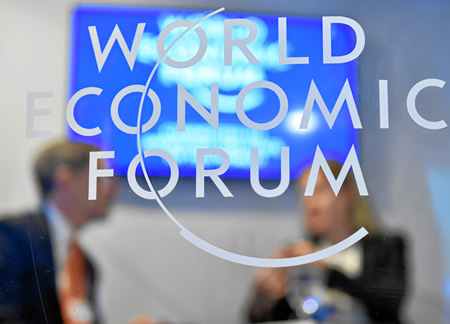
Photo: The WEF Logo is seen in the congress centre during the Annual Meeting 2016 of the World Economic Forum in Davos, Switzerland, January 20, 2016. Image provided by & copyright © World Economic Forum. Photographer: Michael Buholzer.
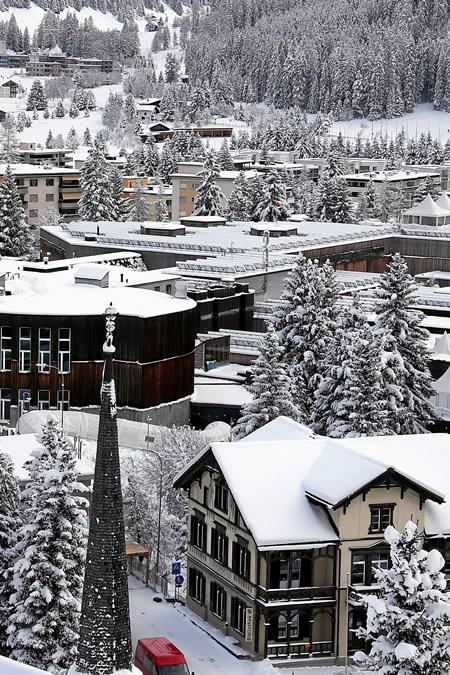
Photo: Congress Centre before the Opening of the Annual Meeting 2016 of the World Economic Forum in Davos, Switzerland, January 14, 2016. Image provided by & copyright © World Economic Forum. Photographer: Andy Mettler.
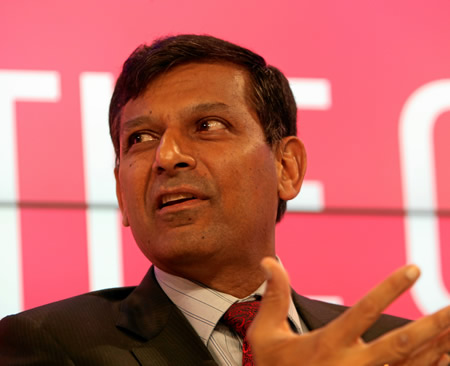
Photo: Raghuram G. Rajan, Governor of the Reserve Bank of India, speaks during the televised session ‘The Growth Illusion’ at the Annual Meeting 2016 of the World Economic Forum in Davos, Switzerland, January 20, 2016. Image provided by & copyright © World Economic Forum. Photographer: Monika Flueckiger.
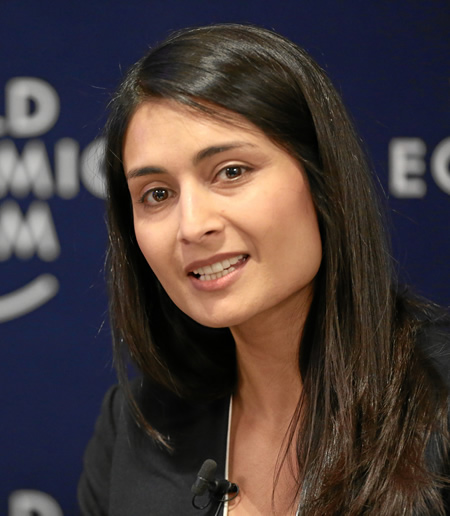
Photo: Saadia Zahidi, Head of Employment and Gender Initiatives, Member of the Executive Committee, World Economic Forum, is captured during the session ‘The Gender Impact of the Fourth Industrial Revolution’ at the Annual Meeting 2016 of the World Economic Forum in Davos, Switzerland, January 21, 2016. Image provided by & copyright © World Economic Forum. Photographer: Jolanda Flubacher.
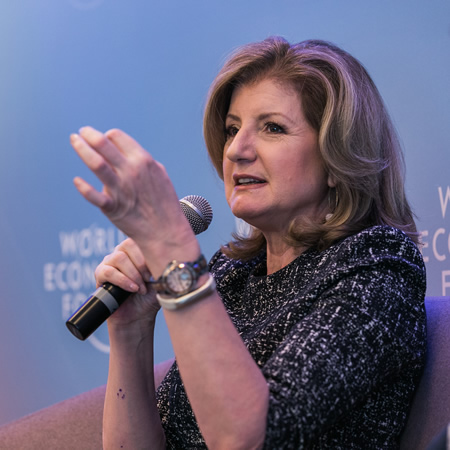
Photo: Arianna Huffington, President and Editor-in-Chief, Huffington Post Media Group, USA, speaking at the Annual Meeting 2016 of the World Economic Forum in Davos, January 20, 2016. Image provided by & copyright © World Economic Forum. Photographer: Benedikt von Loebell.
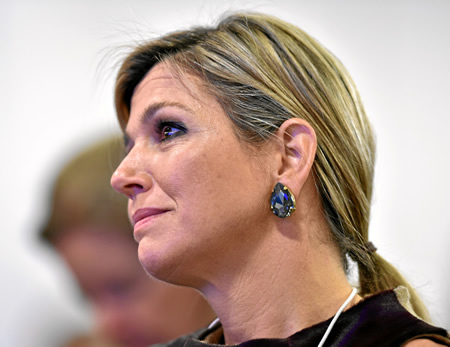
Photo: H.M. Queen Maxima of the Netherlands, United Nations Secretary-General’s Special Advocate for Inclusive Finance, is captured during the session ‘Fostering Financial Inclusion’ at the Annual Meeting 2016 of the World Economic Forum in Davos, Switzerland, January 22, 2016. Image provided by & copyright © World Economic Forum. Photographer: Michael Buholzer.
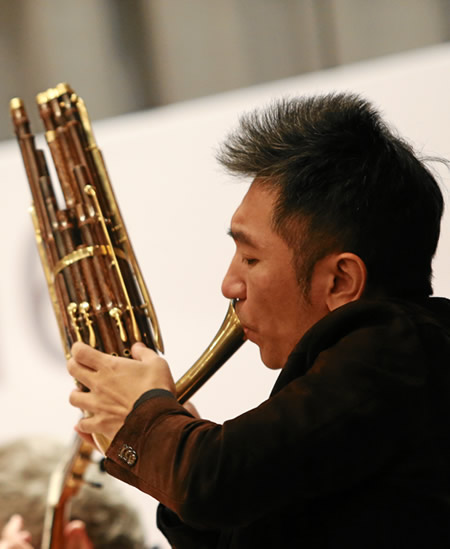
Photo: A musician is captured during the open forum workshop ‘Making Music across Borders with Yo-Yo Ma’ during the Annual Meeting 2016 of the World Economic Forum in Davos, Switzerland, January 20, 2016. Image provided by & copyright © World Economic Forum. Photographer: Monika Flueckiger.
Davos-Klosters, Switzerland, 23 January 2016 - The Board of Trustees of the World Economic Forum yesterday elected Jim Yong Kim, President, The World Bank, Washington DC; and Marc R. Benioff, Chairman and Chief Executive Officer, Salesforce, USA, as its new members.
As of 22 January 2016, the Members of the Board of Trustees of the World Economic Forum are:
- Klaus SCHWAB, Chairman of the Board of Trustees
- Patrick AEBISCHER, President, Swiss Federal Institute of Technology of Lausanne, Switzerland
- H.M. Queen Rania AL ABDULLAH of the Hashemite Kingdom of Jordan
- Mukesh AMBANI, Chairman and Managing Director, Reliance Industries, India
- Marc R. BENIOFF, Chairman and Chief Executive Officer, Salesforce, USA
- Peter BRABECK-LETMATHE, Chairman of the Board, Nestle, Switzerland
- Mark CARNEY, Chairman, Financial Stability Board; Governor of the Bank of England
- Katherine GARRETT-COX, CBE, Chief Executive Officer, Alliance Trust Plc, United Kingdom
- Orit GADIESH, Chairman, Bain & Company, USA
- Al GORE, Vice-President of the United States (1993-2001); Chairman and Co-Founder, Generation Investment Management, USA
- Herman GREF, Chairman of the Board and Chief Executive Officer, Sberbank, Russian Federation
- Angel GURRÃA, Secretary-General, Organisation for Economic Co-operation and Development (OECD), Paris
- Susan HOCKFIELD, President Emerita and Professor, Massachusetts Institute of Technology (MIT), USA
- Jim Yong KIM, President, The World Bank, Washington DC
- Klaus KLEINFELD, Chairman and Chief Executive, Alcoa Inc., USA
- Christine LAGARDE, Managing Director, International Monetary Fund, Washington DC
- Jack MA, Executive Chairman, Alibaba Group, People’s Republic of China
- Peter MAURER, President, International Committee of the Red Cross (ICRC), Switzerland
- Luis MORENO, President, Inter-American Development Bank, Washington DC
- Indra NOOYI, Chairman and Chief Executive Officer, PepsiCo, USA
- Joe SCHOENDORF, Venture Partner, Accel Partners, USA
- Jim Hagemann SNABE, Member of the Board, SAP AG, Siemens AG, Allianz SE, Germany
- Heizo TAKENAKA, Director, Global Security Research Institute, Keio University, Japan; Minister of State for Economic and Fiscal Policy of Japan (2002-2006)
- George YEO, Chancellor, Nalanda University; Minister of Foreign Affairs of Singapore (2004-2011)
- Min ZHU, Deputy Managing Director, International Monetary Fund, Washington DC
Over 2,500 leaders from business, government, international organizations, civil society, academia, media and the arts are participating in the 46th World Economic Forum Annual Meeting in Davos-Klosters, Switzerland, on 20-23 January, 2016.
|GlobalGiants.Com|







Edited & Posted by the Editor | 1:22 PM | View the original post
January 29, 2015
World Economic Forum Annual Meeting 2015 Ends
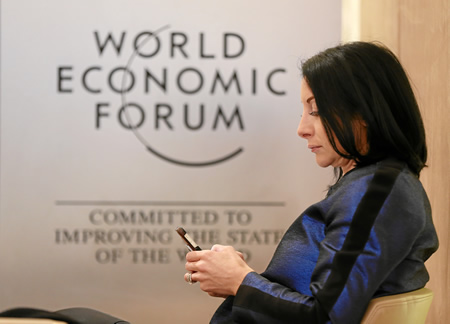
Photo: A participant checks her smartphone during the opening day at the Annual Meeting 2015 of the World Economic Forum at the congress centre in Davos, Switzerland, January 20, 2015. © WORLD ECONOMIC FORUM/Valeriano DiDomenico.
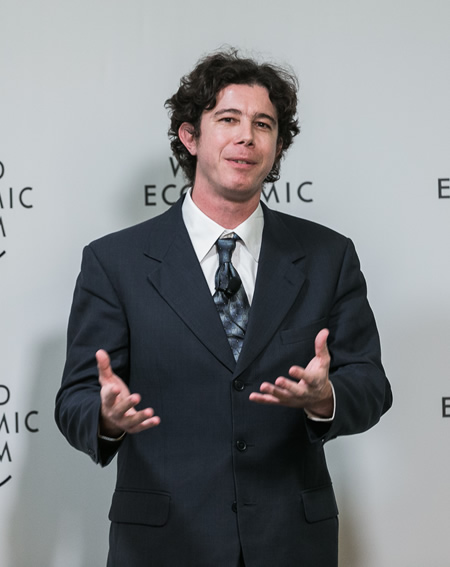
Photo: Pedro Sander, Associate Professor of Computer Science and Engineering, Hong Kong University of Science and Technology, Hong Kong SAR, captured during the session “Merging Virtual and Physical Worlds” in the congress centre at the Annual Meeting 2015 of the World Economic Forum in Davos, Switzerland, January 21, 2015. © WORLD ECONOMIC FORUM/Benedikt von Loebell.
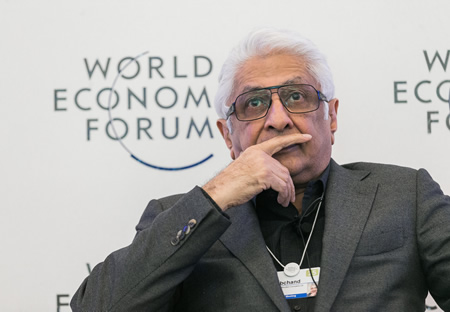
Photo: Ajit Gulabchand, Chairman and Managing Director, Hindustan Construction Company, India, captured during the session “Forum Debate The Bottom Line” in the congress centre at the Annual Meeting 2015 of the World Economic Forum in Davos, Switzerland, January 24, 2015. © WORLD ECONOMIC FORUM/Benedikt von Loebell.
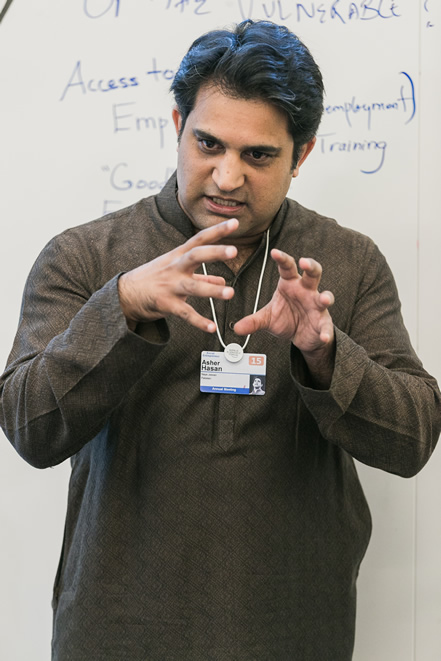
Photo: Asher Hasan, Founder and Chief Executive Officer, Naya Jeevan, Pakistan; Social Entrepreneur, captured during the session “Designing Out Poverty” in the congress centre at the Annual Meeting 2015 of the World Economic Forum in Davos, Switzerland, January 22, 2015. © WORLD ECONOMIC FORUM/Benedikt von Loebell.
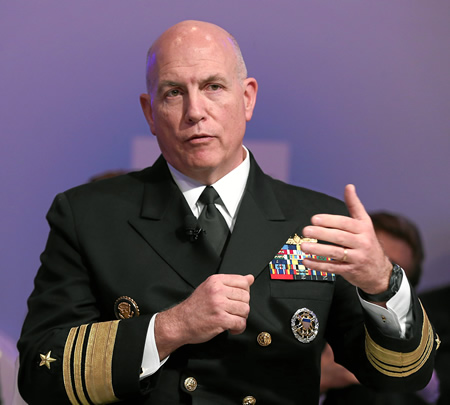
Photo: Kurt Tidd, Vice-Admiral, Departement of Defence, USA, makes a statement during the session “The Future of the Military” at the Annual Meeting 2015 of the World Economic Forum at the congress centre in Davos, Switzerland, January 24, 2015. © WORLD ECONOMIC FORUM/Valeriano DiDomenico.
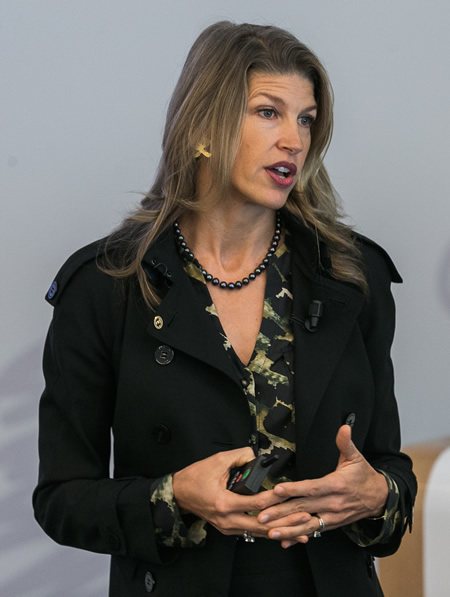
Photo: Julia Novy-Hildesley, Founder and Chief Executive Officer, Resilience in Action, USA, captured during the session “Thinking Ahead with the New Champions” in the congress centre at the Annual Meeting 2015 of the World Economic Forum in Davos, Switzerland, January 24, 2015. © WORLD ECONOMIC FORUM/Benedikt von Loebell.
The World Economic Forum Annual Meeting in Davos, Switzerland, has ended with a debate on the Global Agenda 2015. The session closed a week-long meeting on the world’s most pressing issues and long-term challenges, including inequality and climate change.
The meeting created momentum for the Forum’s regional agendas, thanks to strong representation from governments and business leaders from emerging markets, including Mexico, Indonesia, Nigeria, Turkey and South Africa, in addition to those from Brazil, Russia, India and China.
|GlobalGiants.Com|







Edited & Posted by the Editor | 12:36 AM | View the original post
January 24, 2014
World Economic Forum Annual Meeting 2014: Business Leaders Urge Policy Changes to Restore Trust
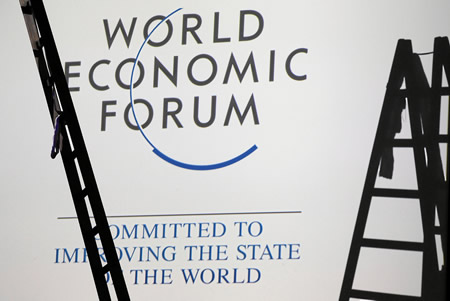
Photo: The logo of the Annual Meeting 2014 of the World Economic Forum is seen at the congress centre in Davos, January 20, 2014. The Annual Meeting 2014 of the World Economic Forum is taking place from January 22 to 25, 2014. Photo © Moritz Hager/World Economic Forum.
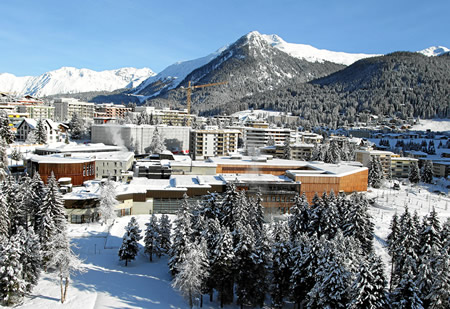
Photo: Aerial view of the congress center of Davos/Switzerland where the World Economic Forum Annual Meeting 2014 is taking place, January 22 - 25, 2014. (Archive photo from 2012). Photo © Andy Mettler/World Economic Forum.
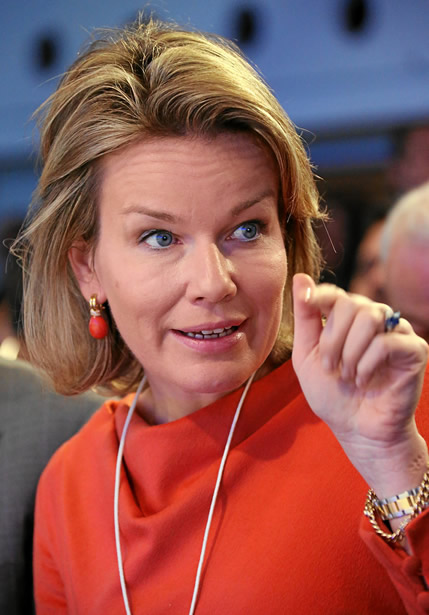
Photo: Queen Mathilde of Belgium is seen in the audience of the session ‘Is Europe Back?’ at the Annual Meeting 2014 of the World Economic Forum at the congress centre in Davos, January 22, 2014. Photo © Remy Steinegger/World Economic Forum.
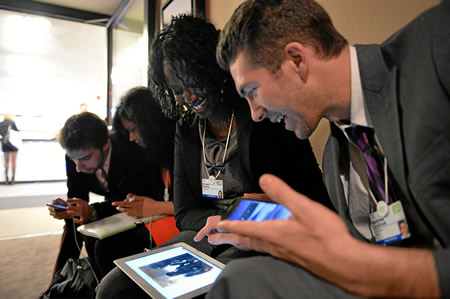
Photo: Participants are captured in the congress centre during the World Economic Forum in Davos, January 22, 2014. Photo © Urs Jaudas/World Economic Forum.
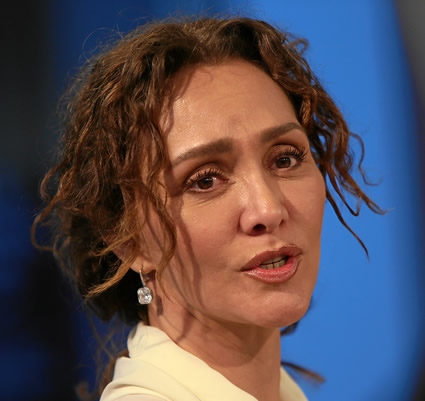
Photo: Angelica Fuentes, Chief Executive Officer, Omnilife-Angelissima-Chivas Group, Mexico; Global Agenda Council on Women’s Empowerment, makes a point during the session ‘Making Gains on Gender Goals’ at the Annual Meeting 2014 of the World Economic Forum at the congress centre in Davos, January 22, 2014. Photo © Christof Sonderegger/World Economic Forum.
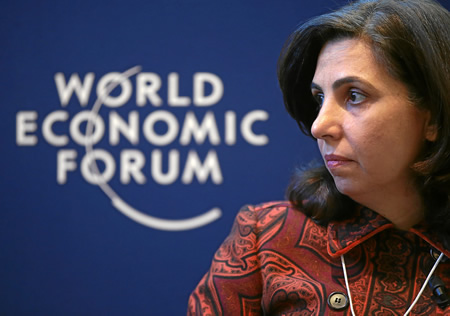
Photo: Rola A. Dashti, Minister of Planning and Development and Minister of State for National Assembly Affairs of Kuwait (2012-2014) listens to the statement of another participant during the session ‘The Arab World Context’ at the Annual Meeting 2014 of the World Economic Forum at the congress centre in Davos, January 22, 2014. Photo © Michael Buholzer/World Economic Forum.
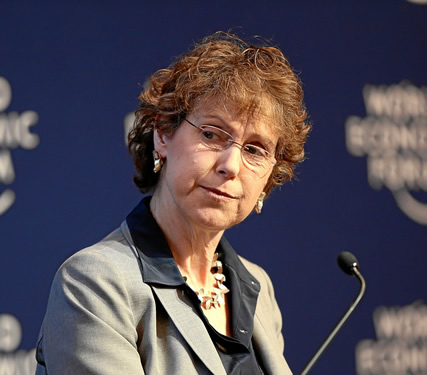
Photo: Anat Admati, George G. C. Parker Professor of Finance and Economics, Stanford Graduate School of Business, USA; Global Agenda Council on New Economic Thinking, is seen during the session ‘Forum Debate: Are Markets Safer Now?’ at the Annual Meeting 2014 of the World Economic Forum at the congress centre in Davos, January 22, 2014. Photo © Jolanda Flubacher/World Economic Forum.
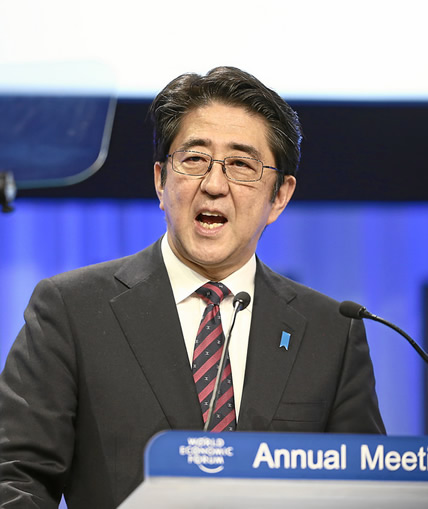
Photo: Shinzo Abe, Prime Minister of Japan talks to the audience during the session ‘The Reshaping of the World: Vision from Japan’ at the Annual Meeting 2014 of the World Economic Forum at the congress centre in Davos, January 22, 2014. Photo © Moritz Hager/World Economic Forum.
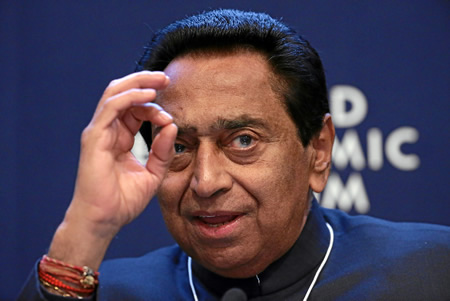
Photo: Kamal Nath, Minister of Urban Development and Minister of Parliamentary Affairs of India speaks during the session ‘The Infrastructure Imperative’ at the Annual Meeting 2014 of the World Economic Forum at the congress centre in Davos, January 23, 2014. Photo © Remy Steinegger/World Economic Forum.
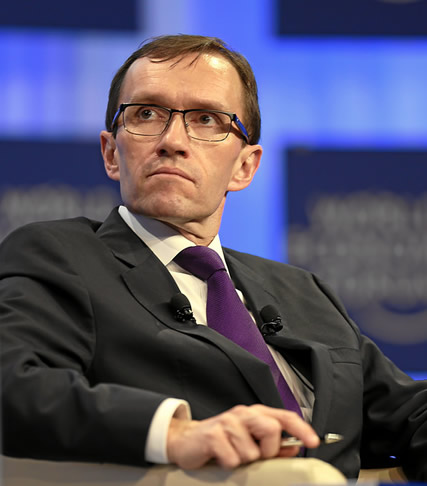
Photo: Espen Barth Eide, Managing Director and Member of the Managing Board, World Economic Forum, listens to the speech of Benjamin Netanyahu during the plenary session ‘Israel’s Economic and Political Outlook’ at the Annual Meeting 2014 of the World Economic Forum at the Congress Centre in Davos, January 23, 2014. Photo © Jolanda Flubacher/World Economic Forum.
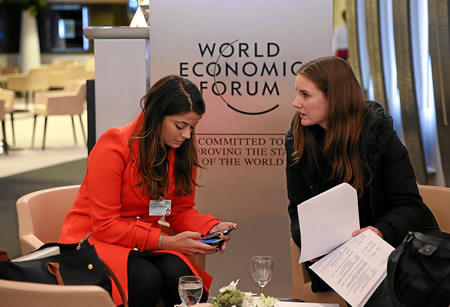
Photo: Members discuss during the arrival day of the Annual Meeting 2014 of the World Economic Forum at the congress centre in Davos, January 21, 2014. Photo © Moritz Hager/World Economic Forum.

Photo: Tea Tasting. Feature of the Annual Meeting 2014 of the World Economic Forum at the congress centre in Davos, January 22, 2014. Photo © Moritz Hager/World Economic Forum.
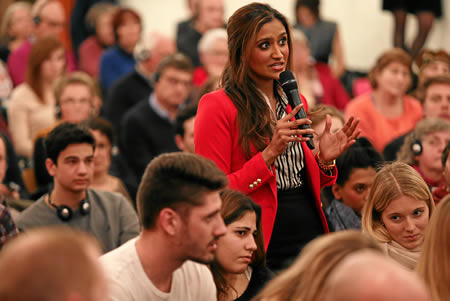
Photo: A participant of in the audience speaks into the microphone during the open forum ‘Higher Education - Investment or Waste?’ at the Annual Meeting 2014 of the World Economic Forum at the Swiss Alpine School (SAMD) in Davos, January 22, 2014. Photo © Christof Sonderegger/World Economic Forum.
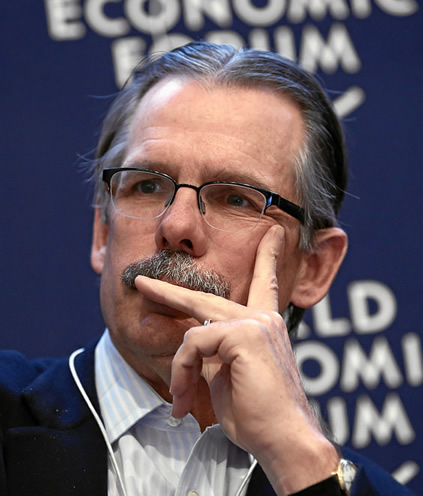
Photo: Glenn H. Hutchins, Co-Founder, Silver Lake, USA, listens during the session ‘Securing US Competitiveness’ at the Annual Meeting 2014 of the World Economic Forum at the congress centre in Davos, January 24, 2014. Photo © Moritz Hage/World Economic Forum.
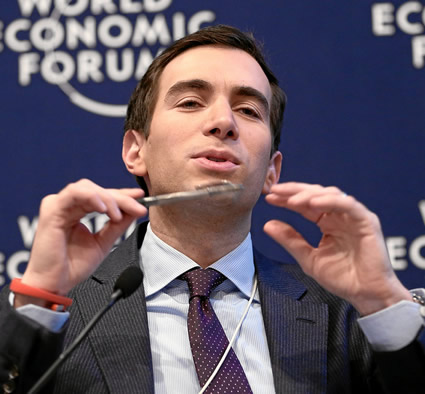
Photo: Andrew R. Sorkin, Columnist, The New York Times, USA, Young Global Leader Alumnus, moderates the session ‘Securing US Competitiveness’ at the Annual Meeting 2014 of the World Economic Forum at the congress centre in Davos, January 24, 2014. Photo © Moritz Hage/World Economic Forum.
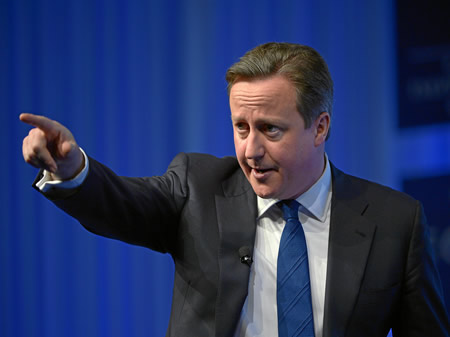
Photo: David Cameron, Prime Minister of the United Kingdom, addresses the participants during the Annual Meeting 2014 of the World Economic Forum at the congress centre in Davos, January 24, 2014. Photo © Urs Jaudas/World Economic Forum.
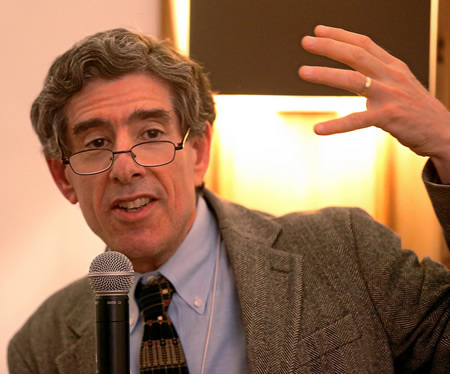
Photo: Richard J. Davidson, William James and Vilas Research Professor of Psychology and Psychiatry, Center for Investigating Healthy Minds, Waisman Center, University of Wisconsin, Madison, USA, is captured during the dinner session ‘The Neuroscience of Leadership’ at the Annual Meeting 2014 of the World Economic Forum at the Hotel Meierhof in Davos, January 22, 2014. Photo © Jolanda Flubacher/World Economic Forum.
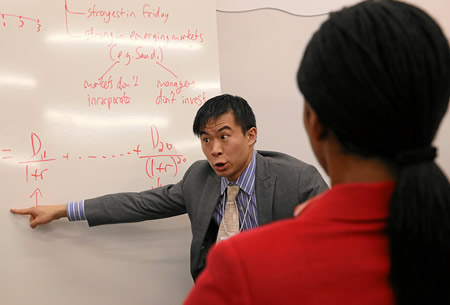
Photo: Alex Edmans, Professor of Finance, London Business School, United Kingdom, makes a point during the session ‘Making Better Decisions’ at the Annual Meeting 2014 of the World Economic Forum at the congress centre in Davos, January 23, 2014. Photo © Christof Sonderegger/World Economic Forum.
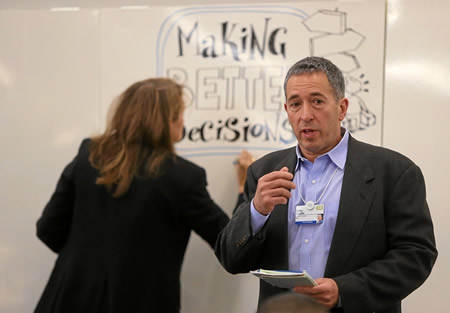
Photo: Eldar Shafir, William Stewart Tod Professor of Psychology and Public Affairs, Princeton University, USA, during the session ‘Making Better Decisions’ at the Annual Meeting 2014 of the World Economic Forum at the congress centre in Davos, January 23, 2014. Photo © Christof Sonderegger/World Economic Forum.
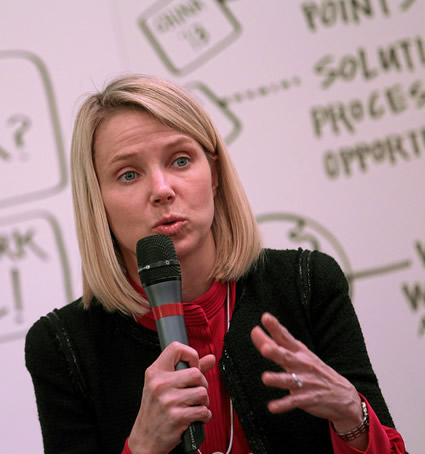
Photo: Marissa Mayer, Chief Executive Officer, Yahoo, USA, Co-Chair of the World Economic Forum Annual Meeting 2014, Young Global Leader, speaks during the session ‘Collaborate to Innovate’ at the Annual Meeting 2014 of the World Economic Forum at the congress centre in Davos, January 24, 2014. Photo © Moritz Hager/World Economic Forum.
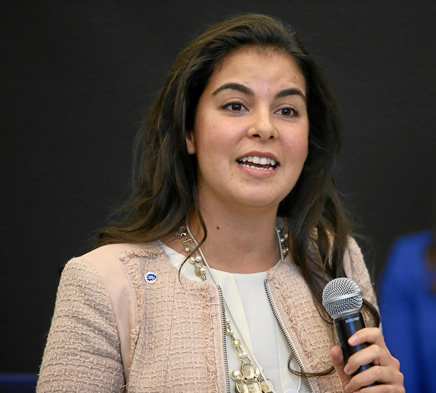
Photo: Caroline Ghosn, Founder and Chief Executive Officer, Levo, USA, Global Shaper, is seen during the workshop ‘Learning from Leading Cities’ at the Annual Meeting 2014 of the World Economic Forum at the congress centre in Davos, January 23, 2014. Photo © Jolanda Flubacher/World Economic Forum.
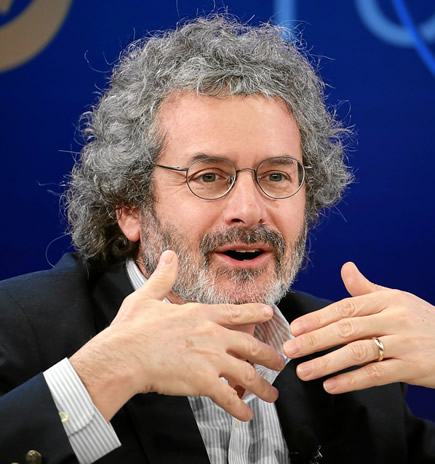
Photo: Neil Gershenfeld, Director, The Center for Bits and Atoms, Massachusetts Institute of Technology (MIT), USA, gestures while speaking during the session ‘From Waste to Wealth’ at the Annual Meeting 2014 of the World Economic Forum at the congress centre in Davos, January 25, 2014. Photo © Remy Steinegger/World Economic Forum.
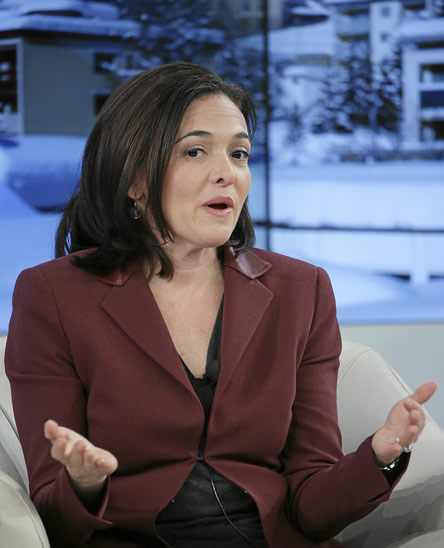
Photo: Sheryl Sandberg, Chief Operating Officer and Member of the Board, Facebook, USA, Young Global Leader Alumnus, gestures while speaking during the session ‘Gender-driven Growth’ at the Annual Meeting 2014 of the World Economic Forum at the congress centre in Davos, January 25, 2014. Photo © Remy Steinegger/World Economic Forum.
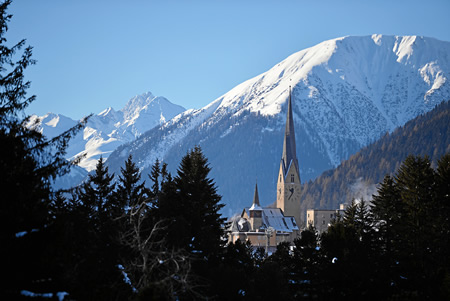
Photo: View to Davos at the last day of the Annual Meeting 2014 of the World Economic Forum at the congress centre in Davos, January 25, 2014. Photo © Urs Jaudas/World Economic Forum.
Business leaders gathered in Davos for the 44th World Economic Forum Annual Meeting called for government policy changes to restore trust between governments, business, and civil society.
• The Annual Meeting is taking place from 22 to 25 January under the theme The reshaping of the World: Consequences for Society, Politics and Business. Participating this year are more than 2,500 participants from 100 countries, including 300 public figures, 1,500 business leaders and representatives from civil society, academia, the media and the arts.
“We must change the dialogue from what we do with the money we make to how we make the money,” Indra Nooyi, Chairman and Chief Executive Officer, PepsiCo, USA, said. “There is an ethical way to run a company and be profitable.” Companies should select board members that understand the importance of sustainable growth, and chief executive officers (CEOs) should inculcate long-term vision in the rising generation of corporate leaders, so policy changes last beyond a single CEO’s tenure. Companies should hire and source locally to encourage job creation and build a larger consumer market.
The business leaders called for corporations to use their influence on business schools to shift business education away from its emphasis on short-term profits. Business schools should teach case studies of companies such as Kodak and Enron that collapsed because of their failures to invest in the long term or manage their businesses ethically. CEOs must remember that short-term investors may be well-organized and vocal, but they do not represent the companies’ true stakeholders. “Many shareholders depend on a company’s long-term performance,” Nooyi said.
The Co-Chairs of the Annual Meeting 2014 are:
• Aliko Dangote, President and Chief Executive Officer, Dangote Group, Nigeria;
• Kris Gopalakrishnan, President, Confederation of Indian Industry (CII); Vice-Chairman, Infosys, India;
• Jiang Jianqing, Chairman of the Board, Industrial and Commercial Bank of China, People’s Republic of China;
• Joseph Jimenez, Chief Executive Officer, Novartis, Switzerland;
• Christophe de Margerie, Chairman and Chief Executive Officer, Total, France;
• Marissa Mayer, Chief Executive Officer, Yahoo, USA, and
• Judith Rodin, President, Rockefeller Foundation, USA.
|GlobalGiants.Com|







Edited & Posted by the Editor | 8:36 AM | View the original post







